#and deserves to commit murder at least once an episode
Explore tagged Tumblr posts
Text









So, I'm a messenger now? [laughs] It's one thing to be passed over, but I didn't count on being demoted to the mail room.
#margo madison#wrenn schmidt#forallmankindedit#for all mankind#god she is so pretty#just so gorgeous#and deserves to commit murder at least once an episode#tv: for all mankind#ch: margo madison#dd: gifs
87 notes
·
View notes
Text
I would like to thank my rescue medication for barely working just well enough just this once so I could watch the first three episodes of The Rings of Power season 2. I would like Charlie Vickers to know he is serving so much cunt the platters are dripping. On a real note, I legitamately haven't seen such a compelling villain in a decade. He was forced to become this. At least he believes he was. He's genuinely suffered. Dude's getting tortured left right and center. He's laser focused and single-minded. Unlike most elves, he's spreading the power evenly, isn't he? He might truly see Galadriel as his equal and want her at his side as his counterweight. And by god, he's just so damn GOOD at it! It's just enjoyable to watch! Every turn you're like, damnit, he planned that too, or a thousand years ago he fucked around with this thing and that paid off I guess!
He's also a murdering sociopathic manipulative narcissistic undying war criminal who wiped an entire region off the map and turned it into ash! Committed heinous painful experiments turning elves into orcs and condemned them to live in pain and misery but still has the audacity to pretend to be their father! A horrible man! Deserves to be punished! Absolutely should not win! I'm just enjoying the show.
#the rings of power#lord of the rings#trop spoilers#halbrand#sauron#trop season 2#trop s2#We love a villain#Eating my popcorn#Evil little man#go off king#King of the south that is#Or king of the orcs#Kind of?#King of mordor?#Definitely king of being a sneaky little bitch#Anatar#Lord of gifts
47 notes
·
View notes
Text
DANCE MARATHON EPISODE (AKA MURDER ON THE DANCE FLOOR)-PART 5
After a quick blowjob break out in the soon-to-be-bloodspattered Stars Hollow High football field, a certain homocidal maniac in a puke green church donation bin coat has returned, and he's ready to dish out some sass. Shane is not in tow yet, but we need to give her time to freshen up and make herself presentable for the remaining few hours of her life.

Lane's pointless bitterness towards Jess is such a fucking waste. My "Lane hates Jess for stupid reasons when they could have been pals" rant has been reheated in the metaphorical microwave too many times already, so I won't repeat myself, but yeah. It's still about that fucking car accident.
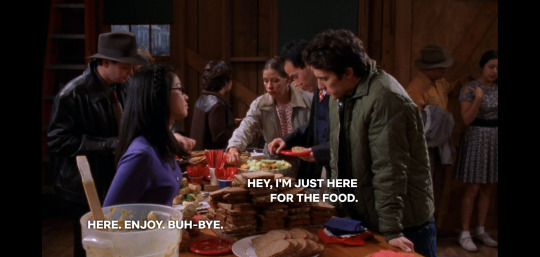
Getting your dick sucked on the high school football field before committing a gruesome homocide can really work up a boy's appetite.

Baby you're such a good noticer. *kisses forehead*

I can't think of anyone more deserving of a rock hard permanent public erection. Wait And now, for what is possibly my favorite five-word exchange in the entire series:

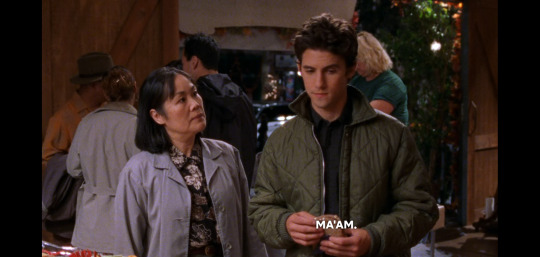
The most perfectly executed dry delivery. Ugh! Sheer perfection!
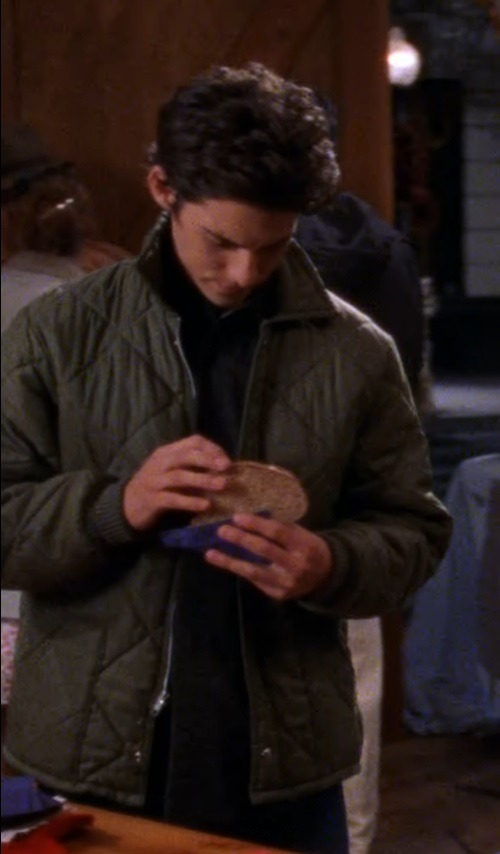
Well, at least egg salad sandwiches beat the Crack and Despair Sandwiches Liz used to pack in his lunchbox.

Miss "My Virginity Spared Me From Becoming Football Field Fertilizer" has arrived with Also-Not-Dancing Butthead in tow. If the food is for the dancers, I better not see him eat anything. I will smack that sandwich out of his hand so fast so help me god (virgins always survive the killing spree).
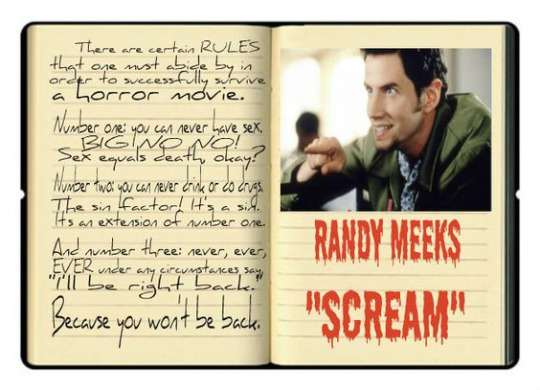

You ever think about what a monstrous hell it must be for Jess living in a place like Stars Hollow? I think about this a lot. But I like to think that off screen he gets in his car and gets the fuck out of there as much as possible. Anyway, this is another perfectly dry one liner that I absolutely love. I want to fil out adoption papers and take all of his sarcastic one liners from this episode home from the shelter. R: You have nothing better to do than sit in a gymnasum staring at a dance marathon? J:Idk, do you have nothing better to do than sit inside a gymnasium staring at a dance marathon? R:Do you think you're bugging me sitting in front of me and staring like that? J: Do you think you're bugging me dancing and staring at me like that? R: I'm not staring at you! J:How do you know I'm staring at you?
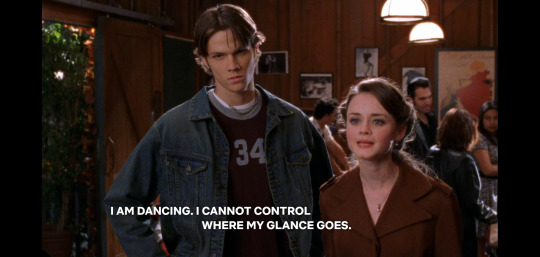
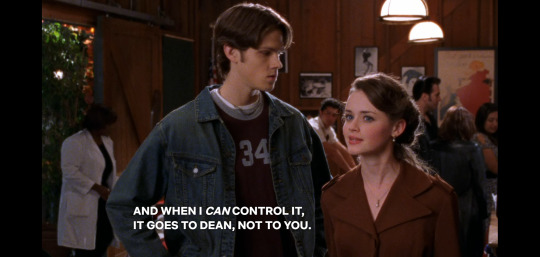
Dean: It's been two years. Maybe you can glance at my dick for once, Rory. Has Rory ever said anything supportive of Dean that wasn't said with the same conviction as if she were a bank robbery hostage? Deany has that constipated look on his face again. Is he sad because no one was staring at him? But someone was. I'll give you a hint, it's a certain MILF who wants to turn that 34 into a 69. Lorelai is 34 years old in this episode, by the way. He's proudly displaying his love of young milfs on his literal sleeve. Listen, you could power Stars Hollow with the combined sexual frustration of these three people + Lane and Dave Ryglaski to make it extra nuclear. When nobody puts out, you get three teenagers eating egg salad and having an "I'm not staring at you!" argument in a school gymansium at 10pm.
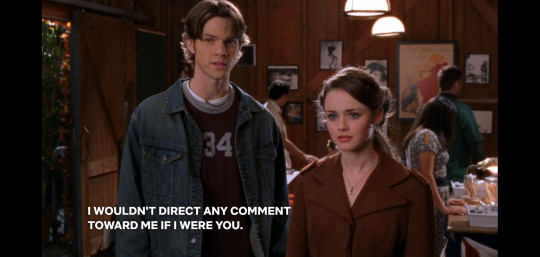
Ooooh. Jess is shakin in his little murder boots. J: I'm supporting my town. R: Go back to New York. Oh Rory babe, if only he could, he'd be home now with a smile on his face with a pushcart hot dog in one hand while some easy alt chick rode his dick. Well, yeah he's got that now but he's going to feed her to the swans then take an 8 month vow of celibacy for some reason.

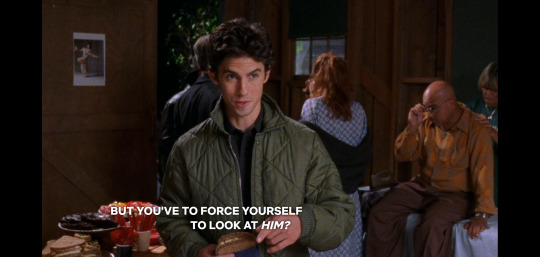
Got em.

He's so LAME. Jared: Hey AmyShermanPalladino, can't Dean get any fun comebacks for once? Why does Milo get all the good sass? AmyShermanPalladino: You can pick from the reject pile. We've got "my former comment still stands" "Are you trying to act tough, you're wearing a tie" and "You're the one who's going"
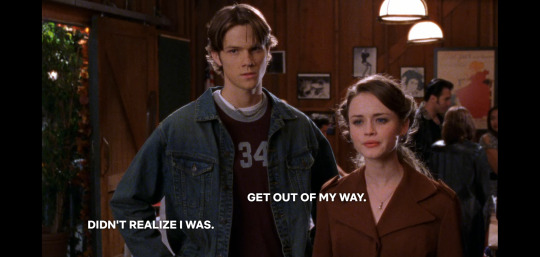
She's so horny. God help her.
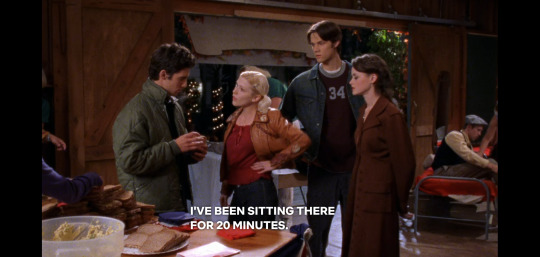
Shane Campbell stars in the newest WB Network vehicle, "My Favorite Murder Victim." He keeps picking at that sandwich like he's going to find a $100 bill in the bread.
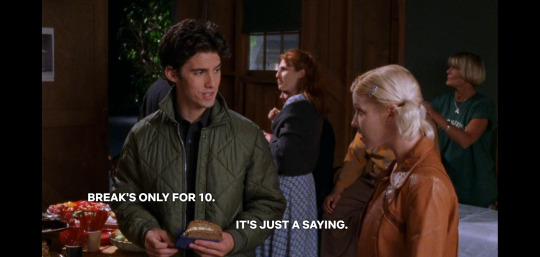
You want this poor girl to spend the last precious hours of her life doing math problems?
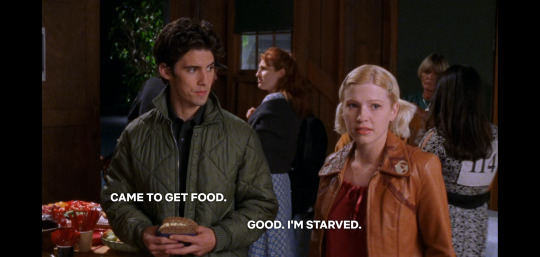
I guess egg salad will wash the taste of dick out of her mouth.
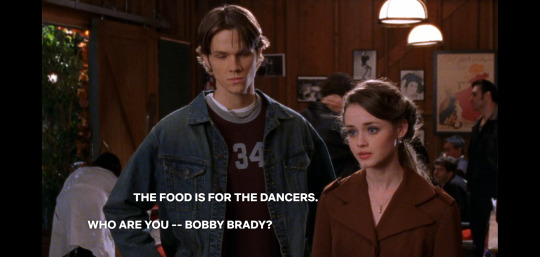
We heard you the first time, Ice Vagina. What is Dean even doing here, lol.
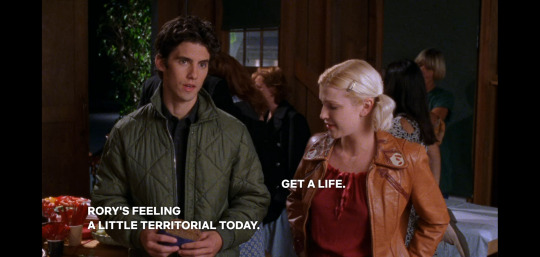
There's something incredibly erotic about this line.
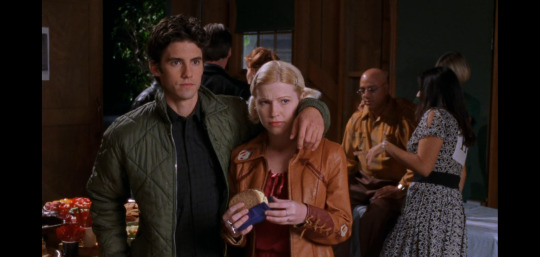
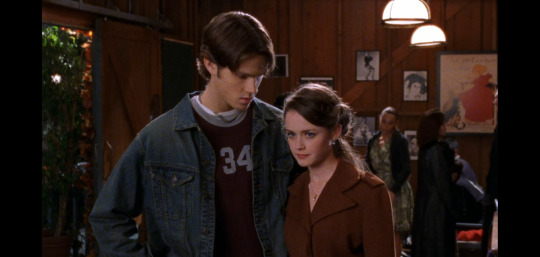
Dean is like, what the hell is going on? Why is she touching me?

*immediately pushes her off*
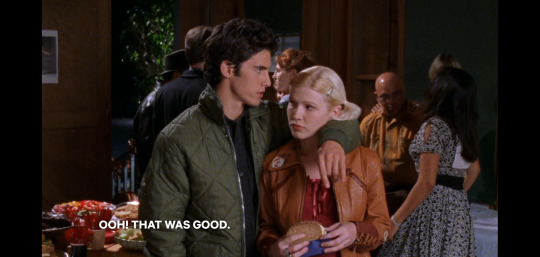
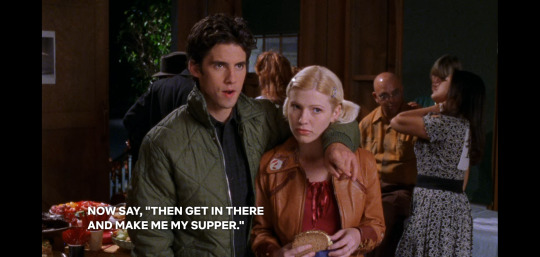
Don't give him any more ideas, Jess.
I just want to point out that on the table behind them, fresh fruit and brownies are available for consumption. You know you guys don't have to eat those sandwiches.

Code for "I'm gonna go find the murder implement I stowed away in the bushes earlier"
#gilmore girls#jess mariano#shane campbell#shane is swan food#denise rewatches gilmore girls#gilmore girls season 3#they shoot gilmores dont they#tsgdt#rory gilmore#I can't believe that like a half dozen people read this shit I write and don't unfollow me#bless your hearts#smoochies#I am fucked in the head#I even held back a few really insane things
41 notes
·
View notes
Text
Dear PTJ, please develope your female characters
Someone complaining abt the way PTJ writes his female characters (truly, a never seen before concept); 1st Afilliate Arc and Cheongliang Arc spoilers (at this point, I think most people are up to date w/ the story, but I'm still gonna put this warning just in case)
Look, I don't take Lookism super seriously. In fact, I think I never did that, mainly thanks to the outlandish concepts it had since the beginning. I'm just here to have fun at this point, and to finally learn the truth about Daniel's 2nd body (omg, it's been 400+ chapters-).
I definitely wasn't expecting to find super well written female characters (even though I definitely should, it's 2024, for God's sake-), something a good number of fighting-related webtoons seem to struggle with. But damn, does Lookism waste its female characters in a way not many have done before.
Since the focus of the story has shifted primarly towards fighting and taking down the Four Crews and Charles Choi, I'm gonna focus on two of the characters most connected to these aspects: Mary Kim and Crystal Choi (ik Lua and Sally are also connected in this way, but I don't really have a lot to say about them and, besides, they've already been covered by another user here on Tumblr)
Mary Kim
The perfect opportunity to get her more involved came up not so long ago, in the ep just before the Allied vs 1st Afilliate fight properly started. We see Mary's reaction upon hearing Vin Jin tell her that Taejin Cheon is alive; we can see her anger asclear as day both in her expression and her words. She literally expresses how much she wants to kill this guy.
And yet, PTJ doesn't make her go and get her revenge. Instead, we have Vin Jin basically saying that he will do it for her because 'his hands are already dirty" (i heavily paraphrased his words, but you get it), which to me, at least, doesn't make sense.
Time and time again we see how close the two of them are in spite of the many jabs they throw at each other. Even without knowing the details of their shared past in Cheongliang (which comes up a couple episodes later), it's very strange that she would let Vin jin go to face him just like that.
By this point, it's already stablished that he murdered somebody, an act that even if deserved by the deceased person, takes a mental toll on the one who does it. Taking this into account, I don't see why Mary would just let who's basically her best friend go through the same thing again, alone. And I especially don't see why she would obey him and stay behind. Her, Mary, the person who never takes Vin Jin's bullshit and always calls him out.
Why not have them both go together? It would be a great opportunity to 1) deal with the last negative reminder of their past, and gain a little bit of closure once and for all, and 2) have Mary finally fight seriously and be able to demonstrate why she's called 'The Empress of Two Seconds' and why she's considered so strong.
We've only seen her take down minor opponents a very, very small number of times, all of which are altercations that don't ever last too long (i guess this last thing is to back up her nickname but, eh)
TLDR: Let Mary dirty her hands as much as Vin. Let them take down together one of the people who has brought them so much pain as the pair of strong besties they are. Stop telling us how strong she is and actually commit to showing it.
__
Crystal Choi
Oh boy, this character-
Like, you mean to tell me that the sole offspring/child of the Big Bad Guy tm the protagonist and his friends are meant to take down, who also happens to be friends with said protagonist, doesn't play a major role on the story? Absolutely insane
And that isn't even taking into account that she also has 2 bodies, which is something only one other character (Daniel, the PROTAGONIST), has and is a major plot point
I'd like to see her be more aware of her privilege as a rich person. Yeah, she was relentlesstly bullied and undermined for her appeareance (which is a horrible thing for anybody to go through) but at least she wasn't poor, too. Does she actually use her money or her status as the daughter of one of the richest men in Korea to change things or solve problems?
Jay literally bought an ambulance of the same type used by the 1st Afilliate so that Allied could sneak in, so why can't Crystal do something similar to help them, too? She helped them during the Gambling Arc by bringing Kouji
I'd like to see her realize and come to terms with the fact that her father's a horrible person. I don't think she knows everything that's going on behind closed doors, but she's definitely smart enough to have noticed that there's something shady going on with his bussiness.
Let her discover the truth. Let her pick either her father's or Daniel's side (the latter which I believe is the most plausible, since she doesn't seem the type to excuse murder, extorsion, etc.). She could act as an informant, helping Allied from the inside.
Heck, you could have her fight, too, if you wanted to. She trained with Gun, after all. And yeah, maybe she's not as strong as the other characters, but we know that she can hold her own against most people. We've seen it.
TLDR: how the hell do you set up a character with so much potential and don't do anything with it. Also, think abt the angst potential!
________________________________________________
Final thoughts, I guess:
I think that Crystal siding with Allied has a higher chance of happening than PTJ letting Mary fight. There's still a good chunk of the story yet to be told, so anything could happen.
I'm actually considering believing that the reason we rarely see the female characters is that they, also, are working secretly to take down the Four Crews and it's gonna get revealed in the last arc for the sake of my sanity
#whyyy wont tumblr let me edit this anymore#i could also talk abt how there's little to no variation in the fem character's body types#or faces#even the male background nameless characters whose only purspose is to be knocked out in 1 single panel have more diversity#lookism#lookism webtoon#i also find it weird how mary's made fun for being fat during the cheongliang arc#and rather it's always framed as a joke/a funny moment we should laugh at#it wasn't funny the 1st time#and it isn't funny now either#and what abt haera shin? the girl in charge of that one squad of people whose job is to fight?#when do we get to see her kick ass?#mospeaks#how do you fumble THIS bad?#fr#mary kim#crystal choi
26 notes
·
View notes
Note
Marinette did WHAT
:)
I assume this is about the Coup thing.
But uh. Yeah.
So the summary of the episode:
Chloé kinda does a thing to frame Mari for hitting her. Like a 'she slaps herself and screams right when Bustier walks in to see the red mark and Mari being held back by her classmates' sort of thing.
Bustier takes them both to the Principal's office but.... Either she knows that it was fake and dragged Mari here anyway, or she thinks it was legit but is begging /Chloé/ to stop being the jerk and apologize for getting slapped?
Either way, she tries some emotional manipulation. Pulling out the gift from 'Zombizou', giving the whole 'I know you're just a sad girl who's never known any love thanks to your bad mother, you can be better than this!' thing. Which is less an inspirational speech and just some emotional blackmail. Especially as this is not a one-on-one conversation but a group meeting in the principal's office in front of a classmate who(supposedly) just assaulted her.
Chloé's like 'wow that's kinda fucked that you'd do this, I'm sure my dad would love to hear it', and Bustier gets fired for that stunt. Understandably!!!
Bustier is upset she got fired because of 'an abuse of power from the mayor'. Gets Akumatized kinda /willingly/(she argues against it, but says that getting Akumatized is the only way to make change, and will de-Akumatize herself as soon as her goal is done.)
She hypnotizes everyone into storming the Mayor's office. Ladybug and Chat Noir are like 'you know what this is a great thing actually let's have her 'talk' to the mayor!'. They are not under the Akuma's power, this is their own choice.
Once in the Mayor's office, Andre is like 'Ya know what? Fuck this shit I'm out. Audrey? I'm getting a divorce. I'm keeping custody of Zoé despite her not being my daughter in any way because I love her most and you're an abusive bitch and she doesn't deserve to be treated the way you treat people. You can keep Chloé though!' and fucks off.
Bustier de-Akumatizes herself and she and the Heroes pat themselves on the back of 'yeah this was totally a good thing and defintely legal!'.
Chloé pops in and is like "I'm sorry, did Ladybug and Chat Noir just team up with the Akuma/Monarch himself to run the mayor out of office??? What kind of bullshit abuse of power is that???? That can't be legal?!". Ladybug attempts to full-force throw her yoyo at Chloé's face(friendly reminder that Chloé is a normal Civillian without powers here.). She's stopped by uh. There was a side plot with Gabriel and Tomoe making an army of robocops for the mayor which Chloé has access to now. So one of those keeps Ladybug from committing at least aggravated assault if not murder.
Chloé then grabs the mayor's sash and says she's Mayor now as the spot is open and apparently that is also legally binding because the people accept that a 14 year old can declare herself mayor.
30 notes
·
View notes
Text
KOMAEDA IN / OUT OF THE PROGRAM


while i write komaeda i think a lot about the difference between him when he's in the neo world program and when he's out of it. specifically when it comes to his knowledge about the outside world.
ultimate despair komaeda has a thought process he has justified to himself to get to the point he got to. as he puts it when talking to kamakura: he knows how to play along. he still has hope as his end goal and likely sees the tragedy as a stepping stone towards hope. he plays along because it suits his goals— that's what he tells himself at least. i do think that there were things that chipped away at him to make him more willing to go along with it. things that junko did to make him more susceptible to joining ultimate despair despite his deep hatred of her and the organization (although his feelings are definitely more complicated than plain hatred). regardless of what specifically got him to this point, we know from another episode that komaeda is still on the side of hope at the end of the day— even as a remnant.
so, when you cut to neo world program komaeda finding out about who they all are... and he has absolutely no context for it... he doesn't know why he would do something like that. all he knows is that he and everyone else seemingly fell into despair and committed horrible atrocities. his view of everyone else is tainted, that much is obvious, but his view of himself was also tainted. knowing that he seemingly threw away hope like that filled him with a deeper self hatred than usual. but because of the circumstances he saw a chance to redeem himself.
it's true that komaeda set up his murder to make it look like it was tortured. it was a multi-layered plan— first make them doubt each other due to shaky alibis and the idea someone may have tortured him for info. if they saw through that (which would be easy), make them think he committed suicide. and then, finally, they may come to the conclusion that it's impossible to find out who actually killed him. we know for a fact his goal was to put the remnants in a hopeless situation and allow hope to win out by keeping the freedom foundation's plant alive.
but i think about the brutality of it all and can't help but think komaeda also did that as an act of punishment to himself. of course, he had to make himself suffer to ensure his luck would actually swing in his favor (his whole bad/good luck cycle tends to work that way), but the excessiveness reads as something personal. he wanted to make himself suffer for the things he had done— because he deserved it. and in sacrificing himself he would get rid of all of the remnants of despair in one fell swoop— making him the ultimate hope.
upon exiting the neo world program i tend to assume that komaeda has all his memories (although it would be fun to one day make verses to play around with that idea). because he remembers everything he once again remembers his justifications— which make him less guilt-ridden than he was in the program. but on top of it he remembers his failure in the program. and i think that really shakes him up. his luck didn't necessarily fail him, but it did allow for despair to win out (in his eyes).
komaeda never expected anyone to believe in his worthless talent, even if he believed in it himself. and i think the fact he failed puts komaeda in this really bitter place. it was his one chance to be important and rise above what he thought he could be, and yet again his philosophy from early in the game proves to be true. you can't be anything more than what you're born as. he should've known better than to believe he could even be close to being someone worthy of the title "ultimate hope."
he's filled with a lot of conflicting feelings he doesn't know how to reconcile. which might actually make him more unreasonable than he was in the first place.
#slightly unrelated but i do think about how he's so willing to die during the game#but in another episode he begs the woh for his life#he has little regard for his life due to his conditions#but he REFUSES to die for a despair-related reason#he fascinates me#because... he's lived long past his life expectancy#and if he's lucky enough for that it means to him that he's likely still around for a reason#komaeda said if he has to die it's going to be for the sake of hope#♡₊˚ ☘️・₊✧ » ic : study ─ 𝘏𝘖𝘗𝘌 𝘚𝘗𝘙𝘐𝘕𝘎𝘚 𝘌𝘛𝘌𝘙𝘕𝘈𝘓 𝘍𝘙𝘖𝘔 𝘛𝘏𝘌 𝘏𝘜𝘔𝘈𝘕 𝘉𝘌𝘈𝘚𝘛. ❞
3 notes
·
View notes
Text
The Kids and Their Visitors
Josephine: Out of the main four kids, Jo is the only one who doesn't get any visitors in the latest episode, continuing her theme of abandonment and isolation in the episode. While it is implied that Rebecca has talked with the kids to get information for her book, we only see her visiting Warren and not Jo or any of the other kids. I do think what happened in this episode is gonna affect her and is eventually gonna pay off but we'll just have to wait and see.
Dusty: The only visitor we see Dusty getting in the latest episode is Cam and is so refreshing to see how much the dynamic between them has changed. Lily and Aiyana have really good chemistry and are amazing actors and it shows in this scene. Cam and Dusty were respectful of each other, more accepting and understanding, more open minded. They were both honest with each other. Maybe they're not friends but they're civil with each other. Cam treated Dusty as an adult, as an actual person (because that's how the system is treating her so why should Cam treat her otherwise?) And you can see that Dusty has now more respect towards Cam and maybe even more understanding (or at least an open mind) of her particular situation, she doesn't see her as a privileged woman or as just cop anymore, there's more to Cam and Dusty knows it. I'm glad that out of the four main kids, Dusty is the one who gets this kind of treatment because she always seemed like the more mentally and emotionally mature one and she deserves to be treated as such. I love how she's not worried about what's gonna happen to her (unlike Warren and Kelly), she has already come to accept her fate and wants justice for Reena because that's the right thing to do.
Which brings me to, Kelly and Warren: The kids who actually committed the crime, the ones who gave the final blow and turned the situation from bad to worst and doomed them all, are being treated as that, kids. "Innocent little kids." Which in my opinion is a mistake. Their scenes were full of lies and manipulations. Stop lying to these kids! They don't need niceness, they don't need false hope. What they need is brutal honesty. Yes, they are "little kids" but the system and the media is not treating them that way, and what their visitors and lawyers should do is prepare them for that. I get where Rebecca and the Ellards are coming from (believe me, I do) and that their lawyers are just doing their jobs but that's not how they should treat them. Be honest! So they (or at least Warren because Kelly is already a lost case) can be honest with you in return and then you'll be able to understand the situation much better. Stop treating them as "just little kids", the system and the media are treating them as murderers, as adults who committed a crime. You don't need to be nice, you need to prepare them, to guide them. Take them seriously and become someone they can trust and be honest with. Treat them as adults and see where that gets you. It got Cam and Dusty somewhere, right? So follow their example.
I love how much Dusty and Cam's scene contrasts with Warren's and Kelly's, not just because of how they were written and directed (open space vs private space, side-by-side vs face-to-face, closeness vs distance, emotion towards Reena vs worried about themselves, and different body language). But also, character-wise. How the fact that Cam treating Dusty as an adult and being honest with her actually got them somewhere. I love how different and calmer ("at peace") Dusty seems compared to the other kids and how she said it was because she was honest about Reena, about what happened, and the hand she had in it and that after everything that happened that's the least she can do, that she owns it to Reena, the girl she once called a friend, the girl who trusted her and she failed.
Also, Jo. She's the only one we see actually following the case. Warren can't bear it, Kelly doesn't care, the other two girls didn't really know Reena and seem too angry about the whole situation to actually care (unless it benefits/affects them). While Jo still seems to talk with the other girls (minus Dusty) and Warren, you can see how much the relationships and the dynamics have changed within the group.
She's also one of the few people who is brutally honest with Warren, she's the one who asks Kelly about the dreams (probably a hint that she also has them). She still seems to want Dusty around but seems like she's respecting Dusty's wishes and boundaries. She's still keeping up an act but at the end of the episode she's stripped down of everything that made her, well, her. She's a leader with no army, and I really want to see where that takes her.
Note: All of this is based on how the show and the actors decided to present these particular scenes to us. How they were written, directed, and acted. I obviously don't know how things actually went down in real life.
#under the bridge#that was a long rant sorry#but i have too many thoughts#this show is giving me too many thoughts#tv rambles
6 notes
·
View notes
Text
Reborn Rich the final episode
What an ending.
It's so bittersweet but I love it. Maybe it's my obsession with Jin Do Jun, but if you follow the actual chronology of things - Do Jun was reborn as Hyun Woo first. Because he died first. And if fate cannot be changed then he was meant to recover his memories as Jin Do Jun, which had alread been burried within him. Even before Hyun Woo "died" (for a week), it was meant to happen. So who is really who at the end? As Hyun Woo called it, you could think of it as repentance, but for me personally, Do Jun existed in Hyun Woo long before Hyun Woo got "reborn" as Do Jun.
All that being said, I do have some very smaaaaaall issues with the ending.
First, it felt rushed. Honestly the last 3 episodes or so felt really rushed compared to the rest of the drama's pace. Everything that needed to happen still happened, but it was just.... I don't wanna say half-baked but.....
Second, Hyun Woo got shot straight in the head point blank. You're telling me he miraculously survived that? Sure there are some miracles that happene even in real life, but it's a patter I hate with tv shows, nto just kdrama. At the very least, he would've needed years to recover. Although, if I really want to defend it, I could say the years he spent as Do Jun somehow changed Hyun Woo's brain's perception of time which afforded him just enough time to recover. Still, between Do Jun's and Hyun Woo's death, Do Jun would've had a much higher survival rate than Hyun Woo. Sure, Do Jun's car got slammed pretty hard, but it's not comparable to getting shot at point blank IN THE FREAKING HEAD, now is it? :/
Also I would've loved to see the actual process of Mr. Oh Se Hyun working with Do Jun's mother, instead of just hearing about all the things they're gonna do..... but we don't get to see them.
Jin Sung Jun's character deserved more too. Sure he was greedy, but he was not guilty of ordering Do Jun's murder. Both times he was innocent. He knew everyone would've suspected him, which is was exactly what his father wanted. It's the reason why he got the company in the first place. Sung Jun deserves some justice too. I feel like it would've been that more epic if the show had gone back to the conversation between Hyun Woo and Sung Jun from episode 1 and committed to the bond that was forming. Imagine if we had Hyun Woo and Sung Jun working together in the final episodes. Hyun Woo gets to finish Do Jun's deed and Sung Jun finally has a change of heart and pays tribute to his grandfather and runs the company with the same heart his grandfather had.
On a more positive note (says anticupid), Hyun Woo did not end up in a relationship with Min Young! Which makes logical sense, for once. I'm not saying I'm happy that they didn't get together, I'm saying it happened for the right reasons. But I'm sure most of the ship's fans will be satisfied that she seemed to recognize Do Jun in Hyun Woo in the end. One could imagine they did end up meeting up and like.... making babies. Idk.
I liked the future Min Young a lot more. Although for her to become the Soonyang Grim Reapper and wear only black because she was mourning for Do Jun, I really would have loved to see more of their relationship developing at least? As it was all based on only a few times they talked? Briefly? But I guess human emotiones are unpredictable, so it's possible. Anyways, there's that.
A little sad the endings of the rest of the characters were rushed by too, but I didn't see anything that made me think "hmm this doesn't make sense". Honestly, is there not going to be a season 2? Now I'm kinda disappointed, because I wish we had spent more time with how the other characters' life continued. As well as more to see of Do Jun with his family. But I get it, it was never the focus of the show.
All my other thoughts about this drama flew out the window.
I can say it was a lovely experience. I enjoyed this so much despite constantly finding something to nag about. I loved following Jin Do Jun's life, and that particular era in South Korea's history. The real footage they used. I loved Jin Yang Cheol's character, I loved Lee Sung Min's acting (as well as Joong Ki's, always).
It made me cry a couple of times and any drama that invokes real emotion in me keeps a spot in my heart. Especially when Ha In Seok went to testify and thought Hyun Woo was Do Jun (was he wrong though?) and wanted to protect him. The unspoken hero of this show. It was a fantastic story, even if we look at it only from Do Jun's perspective, it makes for an amazing story. Had Hyun Woo not even been a part of this drama, I would've still loved just watching Do Jun and his grandpa. Hyun Woo's growth at the end was the bonus for me. I get to exprience something which unlocked his cage and his heart. The boy who grew up in poverty and had many hardships because of it, the boy who willingly walked into a cage because of his trauma caused by poverty. He put his emotions aside, thinking that money was more important than them. Finally, he was freed from it all.
With a new look on life, a new heart and a new dream, he was able to leave all of his hurt behind and live in a way that not only fits him better, as a human, but also a life that Do Jun would be proud to see him live.
Ugh. I'm gonna miss Do Jun's smile though. I know Joong Ki plays both, but that smile is now Do Jun's until the day I die and there's no changing my mind.
Alright, time to go cry in a dark corner. I love-hate this ending.
#reborn rich#reborn rich final#kdrama#kdrama talk#kdrama thoughts#korean drama#the youngest son of a conglomerate#song joong ki#lee sung min#shin hyun bin#kim hyun#yoon je moon#kim jung nan#kim nam hee#moon sung hyun#park ji hyun#jo han chul#seo jae hee#cho hye joo#kim shin rok#kim do hyun#kim young jae#jung hye young#kang ki doong#park hyuk kwon#tiffany young#park ji hoon#reborn remon
25 notes
·
View notes
Text
Rules: share something about an idea you have/something that's speaking to you/an au you'd like to see and are considering writing/etc. etc. Basically anything that is tempting you away from your current wips!
tagged by @supernovasimplicity for this one. i don’t write anymore, so this is a monument to all my sins (my 50000 drafts in my notes app) instead. consider this the list of things i would have written were i capable of the remotest bit of commitment. fully naming and shaming a whole bunch of past fandoms here too.
kinnporsche - SPH chapters whatever to whatever would have been the end: this counts because it is the biggest casualty in terms of scope. there are at least three more arcs i was planning, including the promised-but-never-delivered murderboner adventures, a revenge/separation arc, and the ending has been planned out for months. it is basically guaranteed never to see the light of day. www sad trombone dot com. - (redacted) vegaspete fantasy AU: this was a me & boots co-production. part of it exists and did get periodically picked at and the outline got revised a thousand times, but what was supposed to be conveyed as a fairytale with a deft touch, it had all the subtlety of the claw end of a hammer. this is the one i’ll drink about years from now and be bummed i never finished it. - i once promised dearly beloved @trueplainhearts i would write her the missing scene vegasmacau episode 2 cleanup after porsche’s bullshit at the koi pond. probably the one I’m most surprised no one has written (to my knowledge, which is minimal). - all the prompts i got for vp one-shots. these keep me up nights. they’re rotting in my askbox in the hopes i’ll get my shit together. have not forgotten them, just never moved the needle one iota. actually, that’s a lie. i have half a one-shot where macau runs his own horrible cooking youtube channel with a very game pete who will eat basically anything. probably the one closest to completion.
the flash - lord HELP me i was so on my bullshit about a show that continually betrayed me at every turn and stopped being good after two seasons despite running for nine. (i did quit after s3, but the rage will be lifelong.) anyway that shit inexplicably ruled my life because hearts and sparkles hearts and sparkles all the love in the world for my beautiful sad gay deaf mallgoth hartley rathaway, most beloved of his horrible stupid name. i dreadfully miss playing in that sandbox. i went old-school crackship and had my own decades-spanning world set up for two characters who never met in canon because i want nothing more than traumatized embittered brilliant characters hated by their own family and the people around them to ultimately create their own homes and happinesses. i wrote perhaps an ungodly amount of twitter DM harry wells/hartley rathaway fic but didn’t explore 95% of the world we created. i had millions of ideas i wanted to write for them — some domestic, some porny, some healing, some of those deep dives into disability and anger and grief -- and boy did i fail to write almost all of it. god, that show did not deserve the amount of time and energy and effort i poured into it but it was so creatively fulfilling and it’ll always be a place i come home to. - i would, of course, be remiss if i just acted like a saintly crackshipper while i stank up that fandom when in reality this was the OG murderboner adventures show for me and in the course of making this post i DID find the actual murderboner adventure fic (which i wrote in second person and do not remember doing at ALL) and not finishing that one for an audience of zero is a regret. harrison/hartley was SUCH an underrated ship in the fandom and no one wanted to make it as disgusting as i did despite the fact that it had SUCH ripe elements for a toxic, codependent, abusive, easily-murderous mess of a relationship. young traumatized alienated genius desperately seeks the withheld approval of an authority figure! COME ON PEOPLE GET IT TOGETHER. a boy who would easily kill for you if it meant you would cast your gaze his way for only a moment and who would be blind to how much of himself he’s lost until it’s too late — it was a certified me fic through and through. there was so much murder. so many boners. RIP :( - tbh i had a lot of fucked-up porn wips for this series. i was really into some disgusting fucking non-con and trying to find like-minded degens to share it with was a fool’s errand. hope no one ever steals my phone and finds them all.
all the other shit - i still get a little prickle of guilt over never finishing a detroit evolution wip about my favorite subject, traumatized and isolated boys wrestling with the concept of being loved and cared for after years of loneliness and fury. i was never a good fit for that fandom (true to form) and this just became one of those sore spots i didn’t have the energy to poke at any longer. i always wrote characters too similar to me and then they got uncomfortably personal and i ended up walking away. - lore olympus fans who hate minthe can a) skip this one and b) get the hell off my blog bc i am and always will be a certified minthe stan. love her. adore her. wanted desperately to write the codependent messy dysfunction of the hades/minthe relationship — the unequal power dynamics, the fear and anger of watching someone else get better while you’re not, the careless hurts to release your own pain. i really wanted to capture that loveless misery and just never could nail the vibe i wanted to. - prapaisky. i’m leaving this one as-is bc everyone i know thinks LITA is dogshit but i feel disproportionately strongly about them and wanted to dig into that post-canon recovery. end transmission. - a lot of my stuff never made it out of my brain bc i knew it wouldn’t be worth it to watch it sink like a stone, which was the case with evelyn/walter from one lane bridge. i don’t know anyone who was binging dour nz murder mysteries and it isn’t exactly a canon that begs for a rich ao3 presence, but giving me glimpses of these gentle characters doomed by the narrative and forced into making unspeakable choices put me in a fucking chokehold. i scarfed every tiny crumb i got of their story and outright sobbed at the ending. watching the lock fall had me in full-on claire danes mode. it was prime character study material and i rewrote their story 500 times in my head bc i knew there wasn’t a chance in hell that thing would get the slightest bit of traction if i slaved over actually writing it. - flex/rita: fuck hbo max fuck zaslav fuck the WORLD. i know doom patrol will end and i will NOT see flex/rita become canon because devan chandler long is on another show and also DC hates me personally. (they should have at least kissed!!!!!! god!!!!! you give a woman a screaming reality-tearing sex-ghost orgasm and yet i can’t even get a chaste smooch out of it!!!!!!!!! god i’m gonna die mad about it.) anyway this was a fun one to plot out in my head bc it was all about sketching out flex’s backstory and exploring hero worship in the contexts of celebrity vs literal superhero and the idea of meeting your idols in the most doom-patrol-y way, which is to say decades later when you’ve both been victims of horrific medical, scientific, and magical fuckery but still are in the prime of your life. very rita hayworth in terms of ‘men go to bed with gilda and wake up with me’ in the disconnect between a public-facing persona and the vulnerability of being your ugliest, most honest self. also idk there probably would have been literal rat-fucking or something, it’s doom patrol.
not tagging anyone bc i always know i’m gonna leave someone off so ¯\_(ツ)_/¯ do it if you’re compelled, don’t if you’re not
3 notes
·
View notes
Text
Re: the tags on this post I feel like I should say 2 things
Sorry if that example of abuse sounds too cartoony? I have . many examples . from my family . but I didn't want to put specific/graphic details in the tags for OP/other ppl to have to see and/or be triggered by, so I decided to make it vague and gender neutral. For whatever its worth, the whole jealousy -> physical abuse -> apology with flowers sequence Is something that happened, and might come across as cartoony bc our society doesn't take abuse seriously & makes it a frequent punchline
I'm not the kind of person to be like "😢 But guys we need to remember and acknowledge that X Character did something bad, otherwise we're Liking Fiction Wrong!" and I don't intend to make it a habit. But outside of the who lock of super, I'm not usually into popular things? So I thought it was worthwhile to say at least one time that I'm not the kind of ankn enjoyer to sit here pitying him, I'm the kind to be like "He is such a petulant annoying manipulative little shitstain and his canon love interests deserve better (affectionately, while pointing and laughing)", the same way I am when I'm laughing about the master turning the human race into cannibal murder spheres. It's pretty self-evident in how I talk and act, but... I keep getting recommended re/ader x ankn blogs who portray him as a sad, tortured dom and not, like, a gangly jackass one bad day away from committing war crimes even Before he completely fell. [Ta/tooine massacre, there's a scene in TCW where he suggests smth and Obwn is like "That's Terrorism . "] So like I said, it felt worth it to at least say once that he has Flaws and Was In Charge Of His Own Decisions. The tags I put on this post apply here, and to all of my favorite characters; generally speaking, I exclusively like characters who range from Asshole to Medical Malpractice/Unethical Scientists to War Criminal, not in spite of those things but because they're interesting and fun to me. They say a lot about human nature, the same way that real people with those traits/actions do, without any real people getting hurt from me watching an episode of doccy who
#erin talks#text#the master getting the drumbeat put in his head & then called diseased 🤝🏻 ankn getting his limbs hacked off & burning alive in lava#= *wince* well damn that was hard to watch despite what he did...#anyway I think the worst thing about getting into sw at 26 is that if I'm not Actively listening to music#I keep getting the bad lip reading videos stuck in my head . opening a can of cat food like 🎵 Someday When You Are Older#You Could Get Hit By A Boulder 🎵#I'm doing that summary of apple decapitation now
0 notes
Text
A game of: SMASH OR PASS, regarding my alters, in chronological order of their first appearance (that I remember)
(excluding littles… OBVIOUSLY)
1: ON THE BED, IN THE CAR, ON THE STAIRS, IN PUBLIC, IN PRIVATE, ON VIDEO, TOPPING, BOTTOMING, DOMMING, SUBBING, WHILE EATING, WHILE STARVING, WHILE DRUNK, WHILE SOBER, UNDER THE STARS, OVER THE TABLE, ETC ETC HE’S SO FUCKING HOTTTTTT
(though he’s absolutely the worst most toxic attachment in this list. He was an adult and I was like 13 when he took over my body forcefully, almost committed murder with it, and then raised me to be a soulless, unloveable bastard. He also violated me sexually at least once. I need him so bad though I need him so bad)
2: No. Pass. I was literally him under five years ago, I hate myself too much to fuck a dude who is essentially a different me, but is way more judgemental than me, way less chill than me, and even less morally sound. At least he was more ambitious and hopeful though!
3: Neither, she’s too ethereal and pure… I’d just stare at her in awe for three hours straight and then work up the courage to snuggle with her and weep while she pets my hair
4: Maybe? Idk my parents would definitely approve of him
5: Imagine doing the nasty with a robot xenomorph thing… (that means pass. I’m not like some of you absolute weirdos)
6: SMASHHHHHHH YES YES YES!!!!! (He’s the same dude as #1 at least 30% of the time due to merging, and when he’s not, he’s still really similar and he currently has the same face claim as #1 rn (Fugue Harvey Dent from Gotham Knights, episode 10 “Poison Pill”… **moans and arches back**), so SMASH. But I’d slap his face and spank him a LOT more and a LOT harder than #1 because he’s a lying piece of SHIT which annoys the hell out of me because I’m tryna figure out the truth of what caused all of this and I do NOT appreciate people who get between me and my goals, which is unfair because #1 is actually WAY worse and WAY more toxic)
7. SMASH!!! He’s spooky and kooky and I liked him a lot in the very short time we had together! Also his face claim was Christian Bale’s Gorr, so… (twirls hair and bites lip)
8: PASS PASS PASS she’s lovely I’m sure but that’s Jesus’s MOTHER I need to take a shower in holy water just thinking abt it…
9: Idk depends on which iteration of Barbie she is. If she looks like Margot Robbie then 100% SMASH
10: Pass… They weren’t unsexy per sé but they had 0% sexy energy and 100% emergency situation energy. Like a person sitting next to you under a desk in an active shooter situation telling you to shut tf up
11. PASS. She’s absolutely batshit insane and a cunt… Though I’d prolly hit her up if I was self-loathing and felt like I wanted to be genuinely abused and violated (/nonsexual, /nonhyperbolic)
BONUS!!!! THEORIZED ALTERS:
Theorized alter 1: wow PAAAAAAASSSSSS. I hope I never hear from him again. He makes me feel like absolute SHIT whenever he’s around and he NEVER shuts up!
Theorized alter 2: Hell no PASS I was him like less than nine months ago and he’s pathetic and erratic and insane. Like peak BPD behaviour but not in a tumblr sexy way. Just in a desperate train wreck way. Everyone was right abt him being cringe. Though I do feel bad for him because his behavior was a result of being in so much pain that he was literally being driven insane by it and had to go to the emergency room multiple times for actual physical health issues that literally manifested from the emotional pain itself. He felt like his organs were rotting and/or being lit on fire for like at least nine hours a day, and would do ANYTHING to try and avoid it, even if it meant being horrible and doing horrible shit to try and summon alter #1, who doesn’t feel emotional pain. He didn’t deserve allat he was just tryna succeed
Theorized alter 3: SMASH!!!! I’d be absolutely honored, I could only wish to be worthy of such a gift from his holiness! I suspect he’s prolly (based off of?) the same guy as #1 & #6, though I’ve never met him personally nor do I know much about him. He’s the alter at the top of the entire system hierarchy, I think.
And that’s all the (non-little) hoes in my brain I feel like putting in the effort to remember for this post, though I think I have more.
0 notes
Text
I agree with so many of these points, all around!
As much as I loved Crosshair's S3 arc, I was a bit frustrated that we didn't get to see him do more to atone for his past crimes. We get a few crumbs of him being selfless or helping people, but I would've like a lot more.
Ultimately, I think you're right: he didn't really have a change in morals. He had a change in priorities, in perspective.
I do think he saw that what the Empire was doing was "bad." When we see him in his quarters after the mission to Desix in 2.03, he's clearly been unable to sleep. Like, maybe the choices he made on Desix and Cody's words are haunting him.
However, I think he was able to justify it to himself for a number of reasons: the first and foremost being that -- as he says -- he's a soldier and does what's needed.
Something I don't think we in the TCW/TBB fandom talk about enough is how morally reprehensible the clones' missions and decisions were during The Clone Wars. The Republic is more or less framed as "the good guys," but by modern standards, some of their battle tactics are ... questionable, to say the least. I mean, all those "War Crimes during the Clone Wars" videos exist for a reason.
We don't get to spend a lot of time with Clone Force 99 in "The Clone Wars" show, but the very first mission we hear about is them "putting down an insurrection on Yalbec Prime." This mission -- for whatever reason -- included cutting off the queen's stinger while she was still alive!?! Assuming the Yalbecs are kinda like the Geonosians -- buglike aliens who are sentient -- that's really messed up. Even if you wanna assume the Yalbecs are essentially animals, that'd be like a IRL person bragging that they cut off a rhino's horn while it was still alive. Like, WTF??
Later, once we see CF99 in action, they are very trigger-happy. They love shooting up and destroying droids. And even when they're face-to-face with the Poletecs in 7.02, they seem a little more aggressive than was necessary. I'm pretty sure if Rex hadn't been with them and specifically emphasized that they were to disarm only, CF99 might've handled that very differently.
(SIDE NOTE: I'd also like to point out that TBB S1 has a bit of a double-standard about CF99 members committing war crimes. Crosshair's dark deeds in 1.03 are treated with the weight they deserve. He kills an unarmed/surrendered combatant, then kills one of his own troopers, then orders his colleagues to kill civilians. And this is all given the appropriate dark tone and neon signs saying "This is f*cked up" that it deserves. Meanwhile, in 1.08, Wrecker throws two clone troopers to their deaths -- and I'm pretty sure one or both of them were unarmed -- and it's treated like a joke. Like, WTF?!?! Why is the show OK with Wrecker killing an unarmed clone trooper(s)? He could've easily stunned them, but he actually takes the time to pick them up and throw them to their deaths, and it's framed like it's supposed to be funny ... or a good thing... I'm sorry, but I just have a problem with that.)
EDIT/ADDITION: Let’s also not forget that CF99 had a 100% mission success rate before Kaller AND they didn’t formally report to anyone like Rex and other clones did. So, I would not be at all surprised if they were committing war crimes on a regular basis, especially before Echo joined them. Maybe not “murdering civilians” levels of bad, but still nothing fantastic.
This is all to say that CF99 carried out their missions and did what needed to be done. Sure, they were maybe a bit aggressive and trigger-happy, but they didn't actually hurt any civilians... on-screen.
Then we start with "The Bad Batch" show and the events in 1.01 "Aftermath." I honestly think the writers used this episode to do a "soft makeover" of some characters' personalities. Hunter and Crosshair both seem slightly different than their TCW selves. Hunter is much softer and more compassionate, while Crosshair is even more prickly and aggressive than he was in TCW -- to the point where even his brothers struggle to get along with him.
Now, Crosshair's shift seems partly because of the inhibitor chip. Unlike his brothers, he's more than happy to kill a group of unarmed civilians because "they were plotting against the Emperor."
And while CF99 might've done some morally questionable things during their time in The Clone Wars, they do draw the line at murdering civilians.
And to be clear, Hunter & co. made the right decision. Crosshair and his Imperial squad commit actual war crimes when they return to Onderon in 1.03 "The Replacements." While Crosshair was under the influence of the inhibitor chip at the time, based on what he does later in S1-2, I don't know if he would've done anything differently if he was acting of his own free will.
In my mind, he removed the chip not because the Empire was using it to control him and commit atrocities, but because he almost killed his family while under its influence.
He seems to have no qualms about helping the Empire invade and oppress planets. He only reaches his breaking point when he sees that -- for all the clones' sacrifices -- the Empire treats them as disposable.
That was something Hunter tried to warn him about in 1.15, but Crosshair thought because he was "superior" that he would be immune. He thought he would have a place in the Empire, that he mattered to them, but he didn't.
Ultimately, I think Crosshair stayed with the Empire for a variety of reasons:
Being a soldier was all he'd ever known, and he didn't want to "drift" through the galaxy the way his brothers were, without purpose, and "scavenge like rats" just to put food on the table
He was upset with his brothers for abandoning him
The Empire gave him respect, authority and purpose -- at least initially
The Sunken Cost Fallacy -- he'd already invested so much of his life and energy into serving the Empire, he wanted to see it pay off (probably in terms of a promotion or something)
However, none of these reasons were based on morality or what the Empire supposedly offered people.
In 2.03, Cody says that the Empire establishes peace throughout the galaxy, but this is something Crosshair never talks about. Quite the opposite, in fact. He specifically tells Hunter in 1.16 that the Empire will "control the entire galaxy," and that he's eager to be a part of it.
So, while Cody and other clones might see the Empire as "the Republic but just under a different name" and that they were still working to establish peace and order just like they had during the Clone Wars, Crosshair never mentions this as a reason for staying with the Empire.
Ultimately, Crosshair's character doesn't seem to be one who is driven by morality. He and his brothers probably did all sorts of morally questionable or reprehensible things during the Clone Wars, so maybe he felt like he needed a "compass," rather than a moral code, to guide him and his choices. And that "compass" was loyalty.
Crosshair is loyal to those who are loyal to him.
His brothers abandon him but the Empire doesn't. Along with a continued purpose, it also promotes him and gives him a new squad.
In late S1 but especially in S2, we can see that Crosshair might be second-guessing his loyalty to the Empire. He's stranded on Kamino for 32 days; he's demoted; and no one outside of Cody and ~maybe~ Rampart seem to respect him.
But, that loyalty is finally broken when the Empire leaves him and Mayday for dead and makes it very clear that he is disposable. So, Crosshair turns on them. That's even how he frames it to Hunter in 3.05:
Crosshair: So, yes, I did betray them. After they betrayed me.
So, as you discussed, he rejects his identity as a soldier. He would rather die or be imprisoned for treason than continue to serve an institution that would throw him away like garbage.
Then in late S2 and S3, with his loyalty to the Empire broken, it reverts back to his family. He tries to warn them; he helps Omega escape; he helps Hunter during the fight with the Ice Wyrm; and so on.
Yes, I would've loved getting more glimpses of him atoning for all the terrible things he did with the Empire. And yes, now that you've pointed it out, I do have a problem with how Howzer's beef with Crosshair is framed in 3.06/3.07.
But, I will say: Crosshair did a very big thing in opening up about the CX operatives in 3.06.
Considering how traumatized Crosshair was from his time on Tantiss, I imagine it wasn't easy to talk about how Hemlock tried to turn him into an operative. So, while it arguably wasn't enough to make amends with Howzer, it was at least a step in the right direction.
Crosshair also saves Howzer's life later in 3.07 when CX-2 kills Nemec and Crosshair pushes Howzer out of the way.
(Also, regarding the 3.06 scene where Howzer's like "remember me?" and Crosshair just blinks... maybe he legitimately didn't remember Howzer. I'm playing Devil's Advocate here, but Ryloth was probably 15-18 months before the events of 3.06, and we don't know how long Crosshair was on Ryloth or how many times he and Howzer interacted. We only see a few exchanges between them. Plus, after being imprisoned and tortured on Tantiss for six months, Crosshair might not have immediately have recognized Howzer. So that awkward stare and blink might've been him trying to remember how/where he knows Howzer from because it's before Howzer mentions Ryloth.)
Once Crosshair and his brothers put their lives as soldiers behind them for good and permanently settle on Pabu, I'd hope that Crosshair:
Does whatever he can to atone for his past crimes
Develops a better moral compass than "I'm loyal to those who are loyal to me"
Gets some much-needed therapy
Still, while it wasn't perfect, S3 did a good enough job of making me believe Crosshair is a better person -- or rather, that he's realized who is really worthy of his loyalty. I mean, he didn't offer to help Ventress on board until after she'd proven herself by saving Omega, and even then, he still had doubts and questions about her.
I'd love to see a post-Tantiss comic or get a cameo of them in a possible Clone Rebellion show, because I do think Crosshair is on a better path but he arguably still has a long way to go.
Hot take:
Crosshair does not have the Imperial disillusionment and redemption arc of The Bad Batch
Emerie does.
Crosshair has an arc for sure yes but it's not that.
I was thinking about this scene:
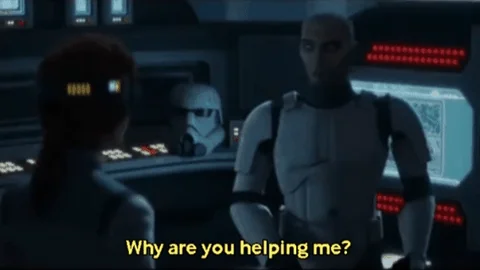
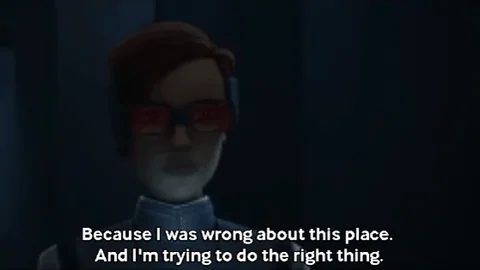
and how it got right what this scene kinda didn't:


(It was so close but then bad writing decided to undercut the moment with a joke rip)
And I think it's really interesting that these characters who were more or less raised into the Empire/First Order and chose to leave it are all directly asked why.
But take a look at Crosshair's answers in comparison:
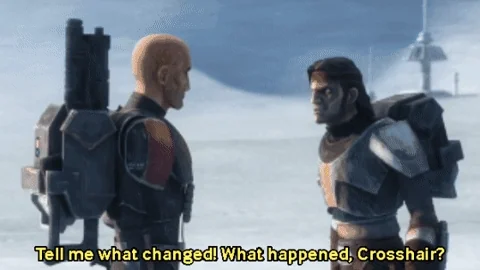
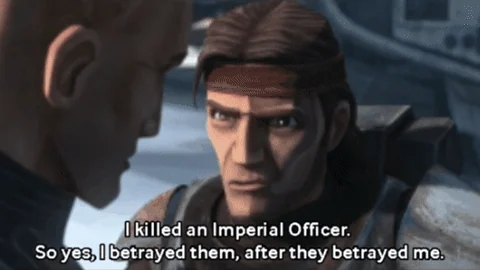
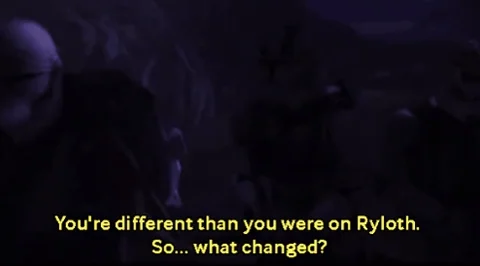
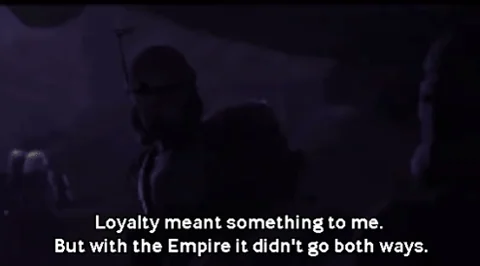
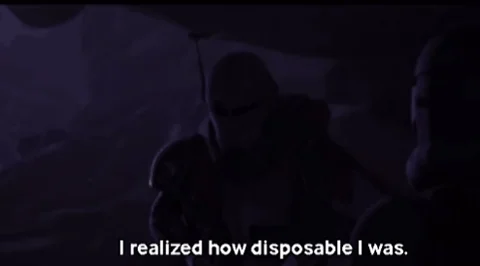
Different context for the asking, yes, but still, compare that to clones like Howzer, Cody, Slip and Cade who left or turned against the Empire because they knew what the Empire is doing is wrong and they weren't just going to blindly follow orders:


Crosshair - Loyalty, Purpose, and Survival
Crosshair didn't choose to join the Empire (though the show isn't very clear or consistent about how much control the inhibitor chips have) but he did, for whatever reason, choose to stay. By the end of S1 we know his chip has been removed and as he definitively says "This is who I am." There were likely still other influences on his decision, but listen to how he talks about the Empire in the S1 finale:
Hunter: Crosshair, I've seen what the Empire is doing. Occupying planets and silencing anyone who stands against them. You know it's not right. Crosshair: You still don’t see the bigger picture, but you will. Hunter: Can't you see they're using you?
Crosshair: We’re not like the regs, we never have been. We’re superior. The Empire can’t protect the galaxy without strength, this is what we were made for. Think of all we could do, together!
Crosshair: You all are meant for more than drifting through the galaxy. It’s time to stop running. Join the Empire, and you will have purpose again.
Hunter: They destroyed an entire city! Crosshair: They did what needed to be done. Kamino, regs, the Republic, that time is over. The Empire will control the entire galaxy, and I am going to be a part of it. Hunter: Don't fool yourself. All you'll ever be to them is a number.
He undeniably knows what the Empire is doing, but he does not care. In fact it sure sounds like he actually supports it and finds self-meaning in it. Hunter spends those episodes trying to convince him it's wrong, he doesn't change his mind. In the end they offer him an out and he doesn't take it.
Wrecker: You coming with us? Crosshair: None of this changes anything. Hunter: You offered us a chance, Crosshair. This is yours. Crosshair: I made my decision.
The next we see Crosshair in "The Solitary Clone" (S2:E3) he follows orders and shoots the Desix governor, right after Cody heartbreakingly tries to do what's right and find a peaceful solution.
Cody: Tell me something, Crosshair. This new Empire, are we making the galaxy better? Crosshair: We’re soldiers, we do what needs to be done. Cody: You know what makes us different from battle droids? We make our own decisions, our own choices. And we have to live with them too.
After this (glorious!) conversation, Crosshair stays. Maybe this began to seed some doubts, but he actually smiles a few scenes later when Rampart assigns him another mission. It seems like for him it truly is as he said in S1:E1 (chip not enhanced yet but still influencing him enough for his brothers to notice he's acting strange):
Crosshair: Republic, Empire... what's the difference.
Crosshair: Orders are orders.
This unethical mission that finally pushed Cody over the edge does not change Crosshair's mind about the Empire, at least not enough for him to take action.
But what does?

Mayday: And here we are, the survivors. Combat troopers stuck babysitting cargo shipments. Crosshair: Mission’s a mission. Mayday: Yeah, I used to say the same thing.
Mayday: After all the clones have done, all we’ve sacrificed. We’re good soldiers, we followed orders. And for what?
This mission has nothing to do with how the fascist Empire treats the galaxy, it's about how they treat their soldiers. It's about how Mayday loyally fought and served his whole life and Lieutenant Nolan let him die
Lt Nolan: He served his purpose as a soldier of the Empire. Crosshair: You could have saved him! Lt Nolan: Perhaps you didn’t hear me, he is expendable, as are you.
Crosshair thought he could find purpose within the Empire, and Nolan shows him exactly what that will be.
His turning point is accompanied with this powerful visual of the ice vulture, a symbol (and threat) of death, and also set up within the episode a symbol of survival:
Mayday: Vicious creatures, but you have to admire ‘em. They find a way to survive.
This critical moment (that gives me chills, oof this episode is a masterpiece!) comes right after Nolan calls him expendable and directly threatens him:
Lt Nolan: And if you speak to me again with such disrespect I'll see to it you meet a similar fate, clone.

then Crosshair sees the vulture's shadow and turns to Mayday's dead body (ahh visual storytelling my beloved) then makes his decision:


Crosshair turns against the Empire not because he believes Hunter was right about this:
Hunter: I've seen what the Empire is doing ... You know it's not right.
but because he was right about this:
Hunter: All you'll ever be to them is a number.
Redemption (both in fiction and irl in my humble opinion) comes with making amends and reparations (which is why death 'redemptions' bother me so much but that's a rant for another time). Unlike Emerie, Crosshair never explicitly denounces the Empire or his own actions within it. He never says anything to specifically show if and how his views have changed from what he said on Kamino. He makes amends with his family (sending the warning message, helping Omega escape, making up with Hunter) but that's about it. The most we get in terms of acknowledgement is this:
Crosshair: I thought I knew what I was getting into with the Empire. I thought I was being a good soldier. Hunter: Nobody really understood what was happening back then. Crosshair: I’ve... done things. I’ve made mistakes. Hunter: I have regrets too, Crosshair. All we can do is keep trying to be better, and who knows there just might be hope for us yet.
Which is nice and all but it's more about them making up as brothers so it's way too excusing tbh ("no one knew what was happening back then" ummm? "The Empire will control the entire galaxy, and I am going to be a part of it" remember? And even if at first Crosshair was being controlled by the chip, the fact that he chose to stay after it was removed* means he condones and is therefore still accountable for those actions).
There's also a bit of self-destructive guilt:
Crosshair: Omega, don't risk anything for me. I belong in here.
Crosshair: Omega needs you both. So I’m doing this alone, it’s what I deserve. Hunter: Don’t even think about plan 99, Crosshair. Omega needs all of us.
(which thank you Hunter for pushing back on the death redemption bs and oh look is that a wrap up for the purpose thing?)
But there's no action taken on his part to make up for what he's done or to stand against the Empire (aside from the bare minimum of help with Tantiss, only after it became personally relevant, which like yeah he had trauma to deal with but still).
While I do think the implications/follow-up of Crosshair's turn should have been handled better in S3 (like rip Howzer! he deserved an apology, but that's a rant for another time), I don't necessarily** think this arc is a bad writing choice. It's just saying different things than we expect:
Maybe Crosshair's story is not about standing up against an unjust system, like we see with many other characters (who deserved more screen time but that's a rant for another timeeee). Maybe his story is about how even those who are loyal to the Empire, who actually believe in it, still suffer under and within it's rule. Not to garner sympathy, but to show that there is no winning.
Crosshair has another 'so what changed' convo in S3:E14 with Rampart, in which they draw parallels to each other:
Rampart: You used to believe good soldiers followed orders. Crosshair: Depends on who's giving them. The Empire betrayed us both. Rampart: And you think you can fight them? That's not you. You're like me, loyal to no one but yourself. Crosshair: I've changed.
(note how he says who's giving the orders, not what the orders are)
"Loyal to no one but yourself" describes Rampart much more than Crosshair, since we often saw Crosshair pride himself as a loyal soldier of the Empire whereas we saw Rampart abuse power to be self-serving within the Empire (like when he killed Wilco to save face). But they were both betrayed either way. Vice Admiral Rampart, snively Imperial opportunist through-and-through, shouts "I was following orders!" as he is arrested for the Empire's purposes.
Even Hemlock, the final boss immoral Imperial scientist, who has to be benefiting the most from this system, echoes the expendability idea:
Hemlock: What I am working on is beyond your understanding. Something so vital to the Empire it makes me indispensable.
Then there's CX-2, also set up as a parallel/foil to Crosshair (fight me), who in the end is discarded as no more than a weapon, a tool that served it's purpose, showing us what would have become of Crosshair if he had stayed.
There is no winning in the Empire. Loyalty is not rewarded, it "doesn't go both ways." Everyone has to fight for their value. Even high ranking individuals** who for a time benefit from the injustice, in the end are just pawns to be used up and cast aside at a whim for the Emperor's gain. Even people who are motivated by self-interest alone cannot survive within this system, the only viable option in this galaxy is to fight the Empire and dismantle that system. (unless you conveniently find a magically safe island to hide away on but that's a rAnT fOr AnOtHeR tImE)
Which brings us back to...
Emerie - Cooperation, Compassion, and Choice
(Okay this post has already gotten away from me but I still want to talk about her to show the contrasts.)
Emerie may not have been given a lot of screen time to really flesh out her development, but there is a lot that is pretty clearly implied with her:
Crosshair: They’ll never turn her [Omega] over. Hemlock: They don’t have a choice. She is a clone, and therefore Imperial property. *Camera cuts to an angle more centered on Emerie’s face*
Crosshair: Give me your access card! Emerie: It won’t get you outside!
Emerie: I tried to warn him what would happen if he did not cooperate with the Doctor.
Emerie: Prisoner? Omega, you are no such thing. It will take time to adjust, but you will acclimate. It is far safer in here than out there.
Emerie: You should go back to your room. Crosshair: You mean her cell?
Emerie: Why children? Hemlock: Children are easier to attain and more agreeable to the subjugations. They are unaware of why they are here and what they possess.
Emerie: They're children. Like I was... Was your plan to discard them too? Nala Se: The Empire will keep them in order to control them.
We don't know a lot about Emerie's background, but it's clear that she had a lot less choice than Crosshair and less opportunity or ability to leave. Unlike Crosshair, we never directly hear Emerie's views of the Empire (and she was most likely 'taken under Hemlock's wing' before the Empire even came to power), but lets look at how she talks about the Tantiss:
"Remain calm. Cooperate and you might survive."
"Don't make this worse, Crosshair! There is no escape!"
"All of us serve a purpose here."
"The Doctor will inform me, if it's necessary."
"It's best not to ask questions."
"Escape is not possible, Omega. This is for your own good."
She honestly does the best she can within the system she is also trapped in. She tries to help Crosshair, Omega, and the vault kids in the only way she knows how (warns Crosshair about the hounds and security, tries to protect Omega from Hemlock, tells Scorch his "actions were extreme" with Jax, insists on overseeing Bayrn's retrieval, double checks his m-count (to give him an out), and tries to find out where he came from). When she gives Omega, and later Eva, the doll, I think it shows just how little she really is able to do here (and it's kinda heartbreaking imo).
The framing of this shot especially (after Jax's escape attempt) visually shows how Emerie herself is trapped/imprisoned:

Despite the fact that very little of this is Emerie's fault, she has very little power and she is doing all she can, the narrative does not excuse her role in the Empire:
Nala Se: What will you do, Emerie? Emerie: There is nothing I can do. I don't have that kind of power. Nala Se: Don't you?
Emerie: I- I was doing my job. Echo: Yeah, I’ve heard that before. You’re a clone. How can you be part of this?
These fighting-the-Bystander-Effect conversations parallel these exchanges:
Hunter: We made a choice, and so did you. Crosshair: Soldiers follow orders. Hunter: Blind allegiance makes you a pawn.
Crosshair: We’re soldiers, we do what needs to be done. Cody: You know what makes us different from battle droids? We make our own decisions, our own choices. And we have to live with them too.
which did not change Crosshair's mind. And honestly, all respect to Echo's disappointed mom glare™ but I think it's clear Emerie had already made her decision, she just needed help to actually be able to do anything about it. When she stopped Echo, with her voice wavering on the verge of tears (ahhh v good voice acting), she clearly had no intention of turning him in. She's on her own in the Empire's most secure facility with very little resources, if she had tried anything on her own she most likely would have failed and been killed
Omega: Emerie, you don't have to do this. Emerie: (sigh) I’m sorry, but I do.
but as soon as she is enabled by an ally, she immediately turns around to help: giving information and getting Echo through security, helping the kids escape, and giving Omega the tablet that allows them to free the other clone prisoners.
Where Crosshair's turn is accompanied by the symbolic imagery of the ice vulture, Emerie's is the removal of her (literally rose-tinted!) glasses:

Symbolizing how she has shed her previous views/indoctrination that altered her perception of the Empire and blinded her to it's wrongs. It's disillusionment.
Emerie's story shows us that even those who are raised and indoctrinated into this system can, should, and will escape (with needed help). Even those who did not choose to be apart of the Empire and are not making the decisions still have the responsibility and ability to act on what they know is right.
Emerie, whose name means 'Home strength' 'Brave' and 'Powerful', and "reflects the importance of leadership and authority in the workplace".***
While Emerie is only in one more scene after her turn, so the wrap up is a bit rushed, she still very simply does what Crosshair does not:
Emerie: Because I was wrong about this place. And I'm trying to do the right thing.
Echo: I’m sure Senator Chuchi would find what you have to say very helpful for our cause. Emerie: I have a lot to make up for. I’d like to help out however I can.
She admits wrong, takes accountability, commits to making amends, and leaves with Echo to go take on the Empire (which hopefully we will get to actually see more of some day).
So, in short, she's showing us how redemption is done right!
---
Notes:
*Whether this writing choice was good/logical/in-character or not is another discussion entirely, but I'm going off of what we were given, what the show is presenting in the canon text and (reasonably inferred/intentional) subtext. Crosshair is pretty multifaceted and I could only touch on so much here. There's a lot of ways to interpret his character/choices, but I tried to avoid the realm of speculation or fanon explanations (even if they sometimes make more sense lol).
**History and political theory are not my area of expertise at all, so I have NO idea how well this aligns with real-world fascism stuff and therefore what implications this storytelling choice could have. I think the message of like 'if you think you could survive or gain power by doing what the Empire/fascist system wants you are wrong' could be good (like how everyone is actually harmed by the patriarchy type of a thing), but I hesitate bc maybe there are those who would benefit, since it's a hierarchal system, right? If anyone more knowledgeable than me has incite to share, by all means
Either way, I do think it works in-story and in-universe though. It's just in the execution. The main problem (even from a strictly theme/character arc stand point) is the lacking follow-up/consequences for Crosshair in S3. Like you gave your character accountability by removing the chip and I think that's great setup for an arc but you gotta follow through with that and actually hold him accountable!
***I'm always curious when clones have 'normal' names, like why did they chose the name Emerie of all things? So I looked it up. Idk how reliable sources are for name meanings so take it with a grain of salt but it's still fun. Fits pretty well, and clones names have definitely had significant meanings in the past (like how Rex and Jesse both mean 'king') so I'm pretty sure it was intentional.
Anyway, thanks for coming to my tedtalk
235 notes
·
View notes
Text
Restless Rewatch: The Untamed, Episode 23, second part
(Masterpost) (Other Canary Stuff)
Warning: Spoilers for All 50 Episodes!
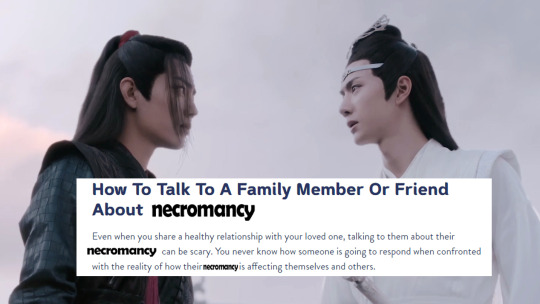
Nature Abhors a (Power) Vacuum
Jin Guangshan, Nie Mingjue, and Lan Xichen have gathered to decide what to do about the remaining Wen people and also what to do about the Yin metal. They have not invited Jiang Cheng to this discussion, or blowhard Clan Leader Yao, despite those clans having been hit particularly hard by the Wens in the course of the war.
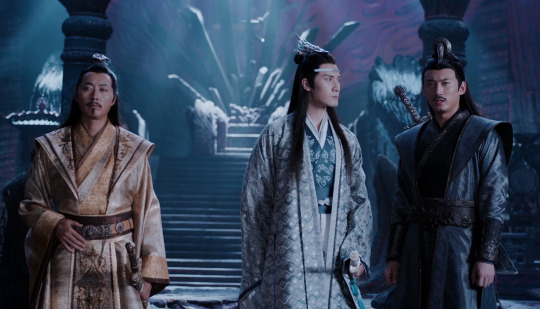
The three of them have a conversation about what to do with the Wen captives, showing their different attitudes towards killing.
Jin Guangshan: Killing is awesome, particularly in project management. It's just so efficient. Nie Mingjue: Killing is necessary, and a little bit fun, too. Lan Xichen: Killing is necessary, sadly, but we can randomly spare some women or old people, as a token sign that we’re not monsters. Kind of like when you have a fancy dinner and include a tofu dish for the vegetarians. Nie Mingjue: Nobody likes tofu, Xichen.

Jin Guangshan says he's looking for the Yin Iron and that they can't let any Wens or "ambitious people" get a hold of it. By ambitious people he means Wei Wuxian, not himself and his murder kid. Lan Xichen realizes this right away but doesn't, you know, do anything to contradict him. Jin Guangshan says he's asked "A-Yao" to look into it. Which is smart, because A-Yao is already in cahoots with Xue Yang, who actually has the piece of Yin Iron they're looking for.
Getting Jiggy With It
Then Jin Guangshan introduces Meng Yao, now renamed Jin Guangyao, in a weird twist on generation names. He has given him the name of a sibling or cousin of his own generation (starting with Guang), rather than a name of the next generation (starting with Zi). JGS says that JGY just recently learned about about being related to him, although we know perfectly well that's not true.
And they both talk like he appreciates JGY's efficiency and helpfulness, but that's not why JGS has him at his side. He has taken him in because he is a steel-eyed murder bot, not in spite of it.
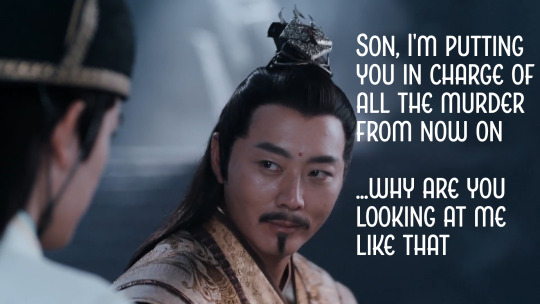
(OP does not believe that Jin Guangyao could have been a good person if only his dad had let him hold Jin Ling that one time, as some have argued. Dude killed his own child because there was a chance he might be disabled in a way that could lead to gossip. Dude is a stone cold killer.)
(more after the cut)
In the language of CDrama costume (which is not, precisely, the language of actual historical clothing), Jin Guangyao has chosen to dress as a minister instead of as a chevalier. This is partly an artifact of his mother's ideas about a gentleman. It also suggests that he’s content with the sort of career that's available to a bastard of a noble house--not inheriting the noble title, but having enough favor to rise in power.
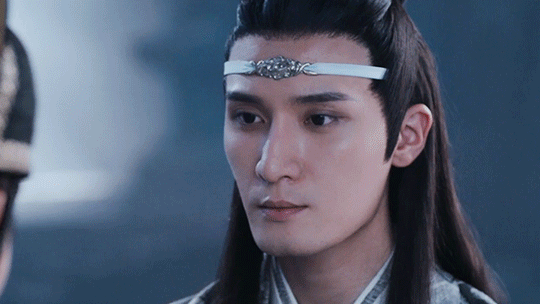
It may also be a ruse to make him seem like he's not a strong cultivator and not a strong fighter, when in fact he is both, at least by the time he’s throwing death chords at Jiang Cheng, much later in the show.
Mingjue makes all kinds of grumpy faces and snarky remarks to let everyone know that he fucking hates Jin Guangyao. Xichen agrees to his “nice refugee camp with only a little death” plan, with no qualifications.
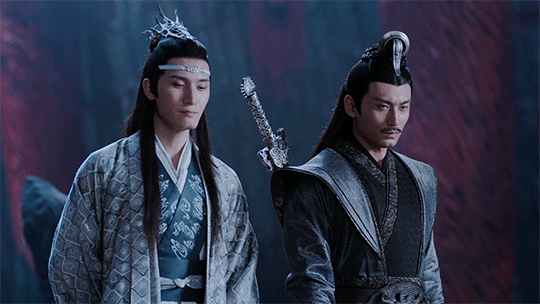
Now we get to see Jin Guangyao's manipulation of Lan Xichen. Lan Xichen says that Nie Mingjue wants a plan that’s more killy, because he believes in punishing evil. JGY deliberately misunderstands this, pretending that Lan Xichen said he, JGY, is evil, kind of forcing LXC to reassure him and take his side in an argument that isn’t actually happening.

They have a little handholding while bowing, and then after Lan Xichen leaves, Jin Guangyao puts on his evil face and has all the prisoners killed behind the big closed door.
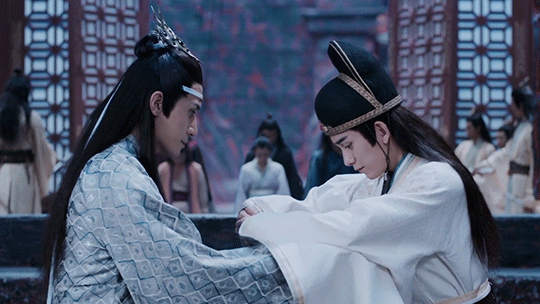
This is done in such a violent fashion that the blood apparently flows up several stairs to the door, and over the tall raised threshold, before flowing downward toward the camera. Some evil is so extreme that even traditional Chinese doorway architecture can’t stop it.
Run To the Rock
Then we go outside to where Wei Wuxian is standing on a rocky outcropping, thinking it would be a good strategic spot to choose if he's ever in a battle where he wants to commit suicide right quick.
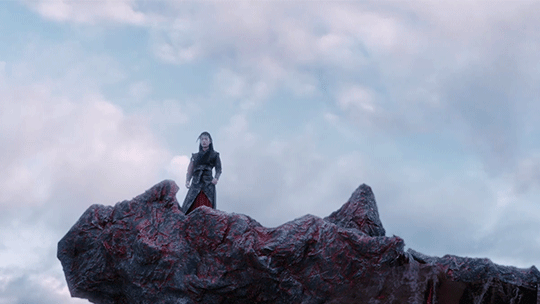
Lan Wangji comes to join him and admire the view, not knowing yet that this view, or one a whole lot like it, is going to be seared into his memory for most of his life.
Lan Wangji is becoming more and more committed to Wei Wuxian, more and more inexorably joined to him, but he still doesn't agree with him. So they each have this comfort in each others' presence at the same time as being massively in conflict.
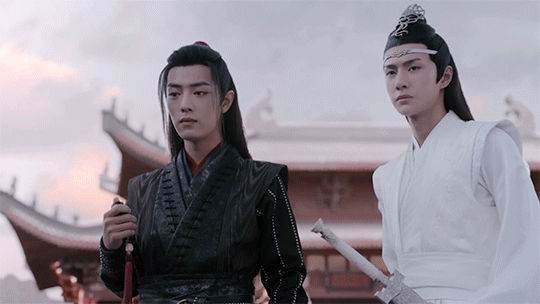
Wei Wuxian asks him what he thinks of all the politicking and murdering. Who is good and who is evil? LWJ doesn't answer because WWX is leaking black smoke, so he grabs him and tells him to concentrate. Lan Wangji is, incidentally, wearing Princess-Leia quantities of lip gloss.
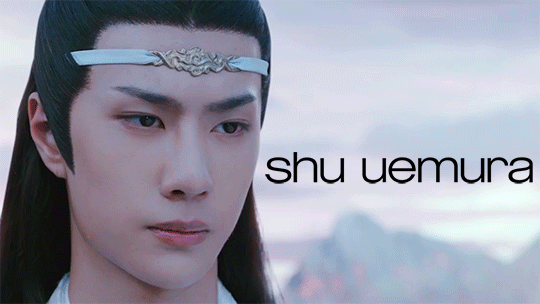
Lan Wangji asks if Wei Wuxian would like to learn a new tune, "Absterge" according to Netflix. The fuck? [op looks it up in the dictionary]. "To cleanse, especially by wiping." Also known as aftercare. Netflix. Honey. This word is MIDDLE FRENCH. Will you knock it the fuck off?
So anyway, instead of answering his question about who is good and who is evil, LWJ asks if he wants to learn a song called "Cleansing." Wei Wuxian says “hey babe, are you fucking kidding me?”
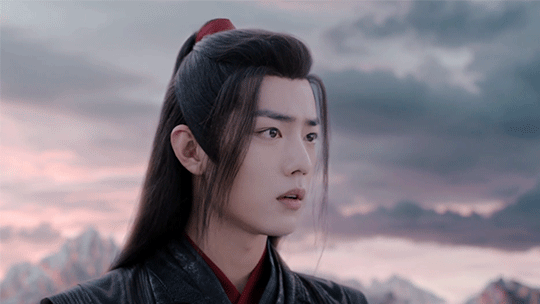
His actual words are "you doubt me too?" meaning "you think I also took the missing 4th chunk of Yin iron to make my ugly tiger amulet, rather than obviously having used that giant sword I pulled out of the turtle?"
Lan Wangji mentally replays Wen Ruohan's questions in his head--the questions he barked at Wei Wuxian right before choking him unconscious--which Lan Wangji also feels entitled to know the answers to. Fuck you, Lan Wangji. He answers WWX with "when did you forge your amulet?" Which is his way of saying "yes, I doubt you."
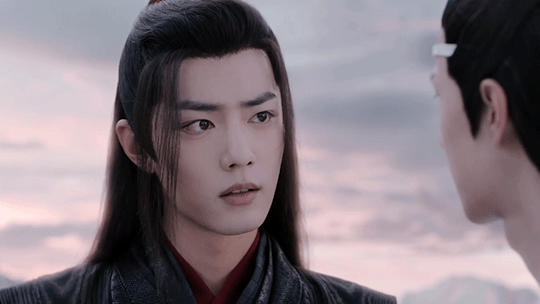
Wei Wuxian kindly refrains from saying "while we were on a break, bitch" and instead tells him the exact truth--I found a yin iron sword in the turtle--but says it in his patented "make it sound like a lie" way.
LWJ keeps grilling him, eventually coming out and saying dude, you knew the sword was Yin iron, why did you need to use it?
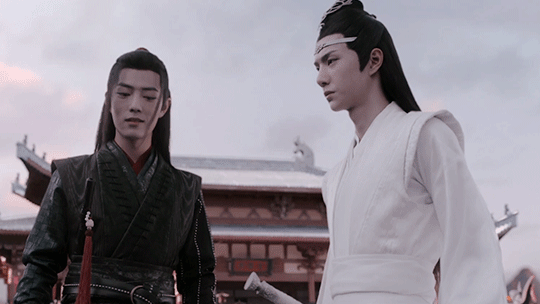
This is the crucial question--why WWX broke his first promise, to Lan Yi, which was to try to get rid of the Yin Iron. He won’t tell anyone the answer, which is that he needs to use it because he can't cultivate normally, because he lost his golden core. He made a lot of promises before that happened, and he probably expected to keep them. But without his core, everything changed; without his core, he’s a different person, so it’s maybe not fair to expect him to honor his previous promises.
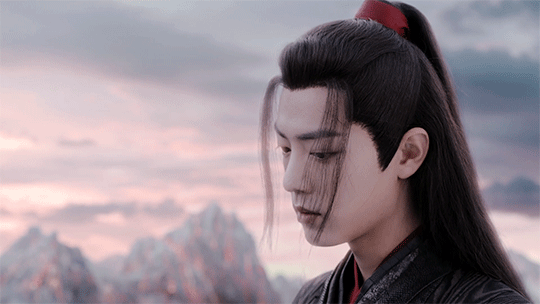
I’m reminded of my grandfather, who was the oldest son of an old southern US family, with lots of expectations as the firstborn. He went off to WWI as a soldier, expecting to die. He didn’t die, and so from that point on, he regarded his life as a gift. He felt could do whatever he wanted with it, and let go of expectations from before the war. He moved to Paris and took up with a glamorous divorcee 7 years older than him (my Grandma, eventually).
The actual point of that story, other than OP having cool grandparents, is that when you think you’re going to die, and then you don’t die, your ideas about what you owe to people can change quite a bit. Wei Wuxian expected to die in the Burial Mounds; he expected to die at Nightless City; he expects it, over and over, and each time he doesn’t die, he gets further and further from being what everyone else wants him to be. And--a lot like soldiers returning from a war-- NOBODY in his life knows how to talk to him about it.
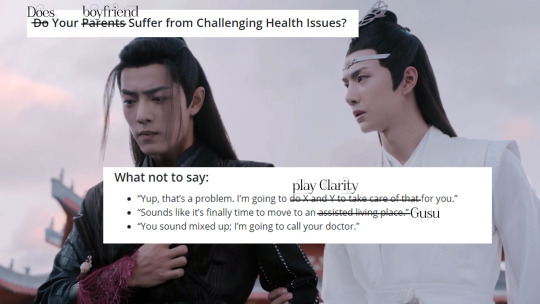
Wei Wuxian tells Lan Wangji to back off, Lan Wangji says why aren't you letting me help you, and they are once again on the edge of the same fight they keep having. Lan Wangji does some impassioned arm holding while Wei Wuxian says he's not like Wen Ruohan.
Romantic Duet #1
The argument is interrupted by screams and killing, so they go to check it out, and find the Jins hunting down some prisoners for sport. They arrive in time to save two people. Yay?
Jin ZIxun acts like a jerk, as always. The new element is that per Jin Guangshan, anyone concerned with Yin Iron shouldn't be alive. He says that the Lan and Nie clans agreed, and challenges Wei Wuxian. Lan Wangji stops him from responding, grabbing his wrist.

The Jins leave and Wei Wuxian refers back to their earlier conversation, saying there will be more resentful spirits now and that "Rest" is the music to play, not "Cleansing."
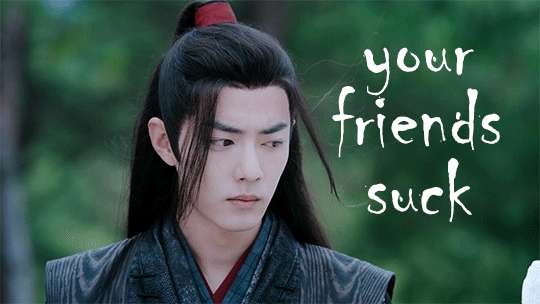
He gives Lan Wangji a long look and then pointedly removes Lan Wangji’s hand from his wrist, by holding his hand, which is some next-level mixed signaling. Lan Wangji totally deserves it at this point, though. He keeps pushing and pushing WWX about his cultivation method, but he refuses to discuss the underlying morality of it, or the morality of the killing going on right in front of them.
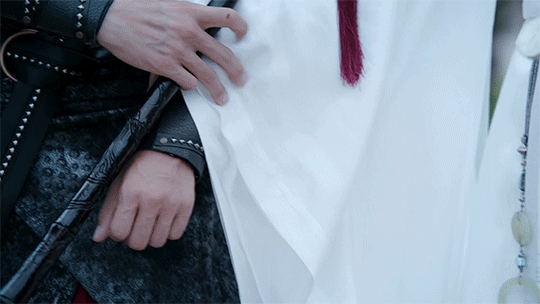
WWX walks off, leaving LWJ to stew in his own juices surrounded by a bunch of fresh corpses.
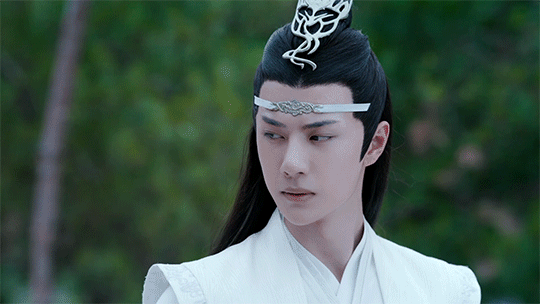
Lan Wangji fails his saving throw against the guilt trip, and sits his ass down to play Rest, just like Wei Ying told him to. So switchy! Wei Wuxian, out of sight but not out of earshot, hears him and accompanies him on Chenqing.
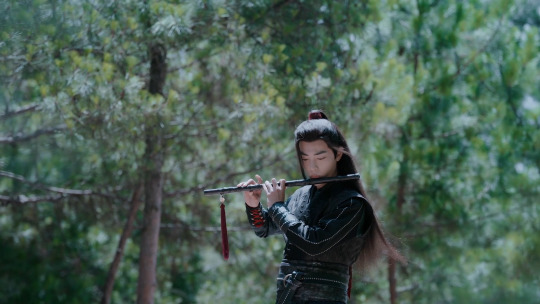
This scene is slightly ridiculous and a whole lot sublime. Ridiculous because it's their first time playing music together, so it's a super slow, romantic, extended scene, but they're surrounded by corpses. And not the helpful, friendly, third-wheel-on-a-date type of corpses.
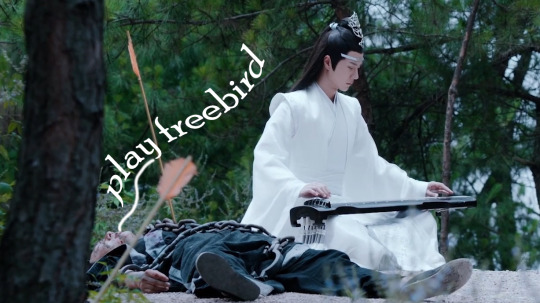
It's sublime because the occasion of their first beautiful, literally magical duet is an argument. And they are joining together to play beautiful romantic music - as a service for the dead. And they are doing it while they are on literally opposite sides of a literal killing field. And Lan Wangji is sitting literally in the middle of a wide open road; the sort of road that they will both reject, metaphorically, later in the show. There is so much about their conflict and their journey that is encapsulated in this one musical moment.
Lan Wangji, by playing the song Wei Wuxian said was needed, is telling WWX that he took his words to heart, that he is listening, even though they're at odds.
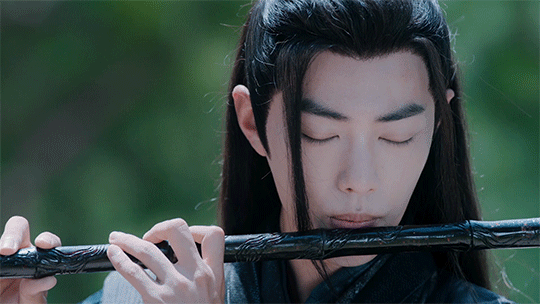
WWX, by stopping and playing with him, is acknowledging this. And by settling the dead souls together, they are both reinforcing their dedication to doing what's right even as they both struggle with knowing what that is.
When Other Friendships Have Been Forgot, Ours Will Still Be Hot
Now we have the sworn brothers thing. I understand, plot wise, why this has to happen, but why would Nie Mingjue ever agree to this? Lan Xichen's puppy eyes are just that persuasive?
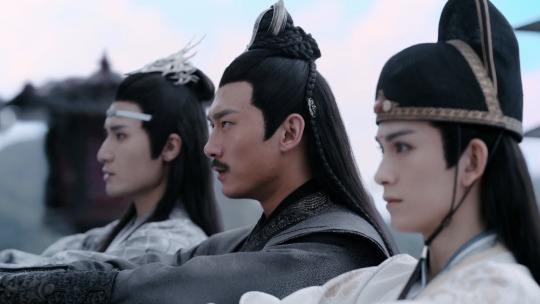
If they ever crack your spine, drop a line If they ever cut your throat, write a note If you’re ever in a mill and get sawed in half, I won’t laugh (HA HA HA HA)
Tedious Party Time
Now there's a cultivation party, which is about as excruciating to watch as it would be to attend.
Everyone is lining up to praise Jin Guangshan. To be fair, he did provide shelter for most of the smaller clans while the war was going on. So being grateful is appropriate, but Clan Leader Yao practically breaks his own neck kissing Jin ass. Yao says JGY’s contribution was the greatest of the war, adding, "fuck Wei Wuxian; everything is his fault."
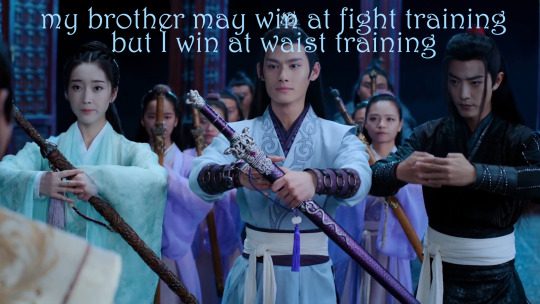
The Jiangs show up wearing mourning belts that show off their itty bitty waists, and Jin Guangshan makes shifty eyes like a cartoon landlord when he sees them arrive.

JGS praises Jiang Cheng, and asks when his fancy clan-leader ceremony is going to happen. Jiang Cheng says he's still in mourning so it's not appropriate. JGS is like “Oh...yeah," as if he totally forgot about all the Yunmeng slaughter, and talks up his friendship with Jiang Fengmian. He acts comforting while WWX manages not to barf.
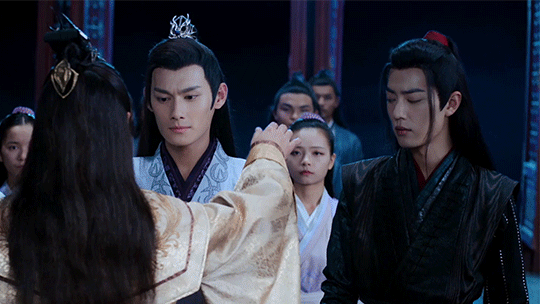
Then the Lan clan shows up and there is nice encouraging chit chat between LXC and JC...
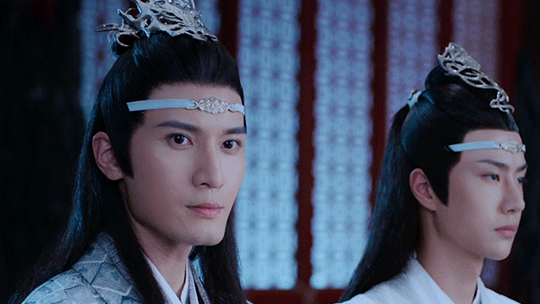
...and just, SO MUCH mournful staring between Lan Wangji and Wei Wuxian.
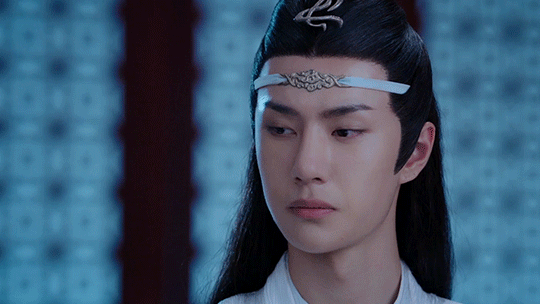
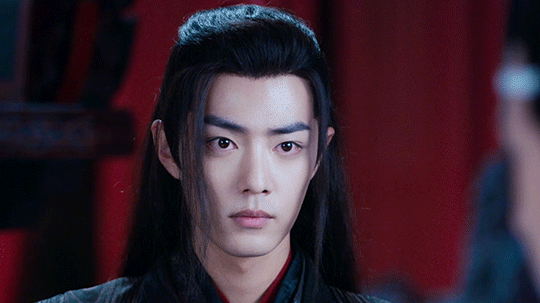
Then the Nies arrive. Jin Guangshan tells Nie Mingjue he's late, and that everyone's waiting for him. That might be true in the script but it’s clearly bullshit on the screen, where the Lans and the Jiangs are still milling around looking for the coat room.
Nie Mingjue--who, let's remember, JUST swore to be brothers with Jin Guangyao--looks at him like he's something that fell off a garbage truck. Lan Xichen jumps in to maximize the discomfort by pointing out that Jin Guangyao should address Nie Mingjue as Big Daddy Da-ge from now on.
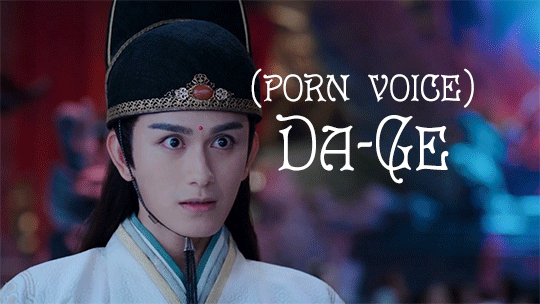
Then the Jins offer Nie Mingjue the giant fire throne because...he's the leader of the Sunshot campaign, I guess? Of course it's all a manipulation tactic, designed to make him say he won't sit there, so that JGS can elevate himself to head cultivator, or something? And sit in front of the throne but not on it? Cultivator succession seems kinda arbitrary.
I swear to god, it wasn't until I was clipping this episode that I realized Wen Ruohan had two thrones and they're in different rooms from each other.
Finally everyone goes to sit down, but because there hasn't been enough fucking awkwardness, JGY stops WWX to ask him what's on his mind. WWX asks him why he's not carrying his sword, which made me laugh and laugh. Wei Wuxian must have been just waiting for a chance to ask someone else that question for a change.
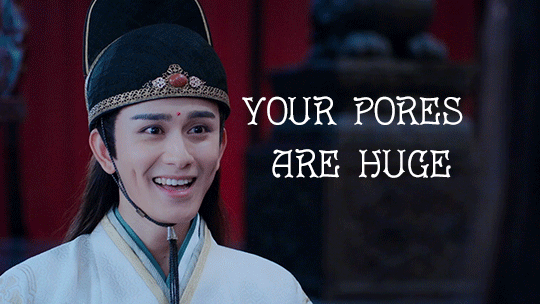
Jin Guangyao says he threw it away, because it was just a random sword, but he really means he had it made into a sneaky murder belt, that he will be using again in 13 to 16 years. They both fake-laugh and trade Mean Girls insults pretend to like each other.
Everyone wanders around toasting each other. Lan Wangji goes to find Wei Wuxian, after first making sure that his hair looks good.
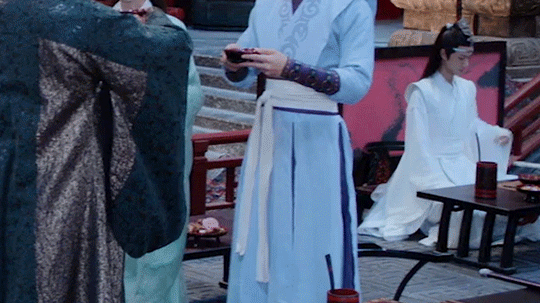
Wei Wuxian is lying around on the steps, sprawling and drinking wine, and not, incidentally, looking for Lan Wangji. He continues to not seek him out and Lan Wangji continues to chase after him.

Wei Wuxian says "how about playing Cleansing?" but Lan Wangji says he's learning a new score. It looks like it's going to be another argument, but then Wei Wuxian smiles and kind of praises Lan Wangji for being stubborn.
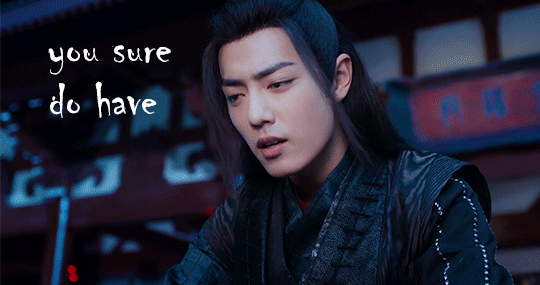
Awkward Marriage Proposal
Just then everyone inside starts cheering for Jin Guangshan to give a speech. Jin Guangshan is making a move to marry Jiang Yanli to his son, which is a big time power grab, given that the Jiang Clan is 1. vulnerable and depleted 2. has control of the Yin tiger amulet.
We get a very rare glimpse into Jiang Cheng’s inner mind, where he thinks that saying yes isn’t a great idea, but isn’t sure what to do. This marriage would make his sister happy, but could destroy the Jiang Clan's independence.
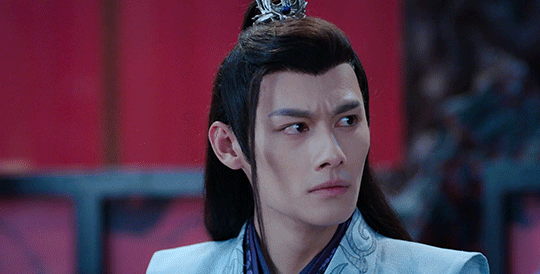
Fortunately, Wei Wuxian joins the party just in time to fuck up Jin Guanshan’s plans. Will this teach Jin Guangshan not to invite Wei Wuxian to parties? It will not.
Soundtrack: Friendship, by Cole Porter (from “Anything Goes”)
Bonus:
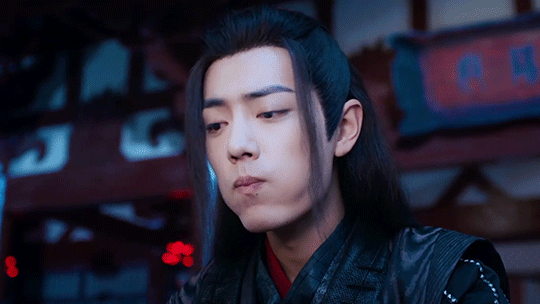
#the untamed#the untamed gifs#wangxian#restless rewatch the untamed#canary3d-original#my gifs#words:2750
247 notes
·
View notes
Note
Zutara. My otp since I first watched as a 10 year old in 2005. Hopefully you'll be kind to them 😉 I'm convinced they'll be cannon in the live action 😅
Alright... *starts digging grave*, I think Katara and Zuko have a wonderful platonic relationship and for them to have a romantic relationship would (1) undermine Zuko’s redemption arc and (2) undermine the found family aspect of their friendship. I don’t have an issue with anyone who ships Zutara and I do not engage in shipping drama, but I think their platonic relationship is too damn important to favor a romantic relationship I don't really think has chemistry.
Personally, I have never gotten romantic vibes from them like... at all? I think the progression of their friendship was important in terms of the show’s themes of forgiving those who deserve it and finding support in people you least expect, but I just don’t get chemistry from them. I’ve always been a Kataang fan but how I feel about Zutara has nothing to do with that. Avatar is one of those shows where I would have been totally fine with it ending with no romantic pairings because the found family aspect of it is so much more powerful.
If anyone has spent 5 seconds on my blog, you know that Zuko is my favorite character and I think he deserves nothing but love and support after all the shit he went through. But a big aspect of why I care about him as a character is that he put the work in to make amends. He didn’t just show up one day saying “I’ve seen the error of my ways, sorry for all the stuff I did, I’m good now” and that was that. He had to work for forgiveness and he did it because he realized the fire nation was wrong, his father was wrong, and he was wrong. His decision to switch sides had nothing to do with any connection with the gaang because he didn’t really know them. His decision to switch sides stemmed from 3 very important things:
(1) He felt guilty not for betraying Aang and Katara in Ba Sing Se, but Iroh. He realized his uncle was the person who had given him unconditional love while Azula and Ozai’s “love” for him was entirely dependent on his ability to provide them results. From this guilt, he was able to realize that his uncle had made the right decision in siding with the Avatar and more importantly, that Ozai was wrong and that all the abuse he endured under him was undeserved.
(2) His experiences in the Earth Kingdom as a refugee. This post explains it really well, but Zuko’s realization that everything he’s believed about the Fire Nation has been wrong is rooted in his moment of empathy with Song and her matching burn scar, his empathy with Lee who lost his brother like Zuko lost Lu Ten, his empathy with Jet who lost his way going to extremes for a cause, and, yes, his empathy with Katara who’s mother was taken from her by the Fire Nation like his was. The reason he switches sides is because after all of those experiences, he can no longer be callous or unfeeling towards the Earth Kingdom like his father or sister. The people of the Earth Kingdom either empathized with him for the pain he went through and appreciated him for his desire to help the helpless (Song, Lee, Jet) or feared and hated him for being part of a country that caused their suffering (Lee, Lee’s mom, Jet, Katara). Throughout season 2, Zuko realized the extent of what the war meant for the other side.
(3) The realization of the extents his father would go to and the truth about Ozai’s amorality. This point is kind of just the culmination of everything in the last two points, but all that set up comes to fruition when Zuko attends the war meeting where Ozai decides to use Sozin’s Comet to commit genocide. By this point he’s racked with guilt over what he did to Iroh, he’s empathized with people who have suffered and is coming to terms with the fact that it’s not only the people of the earth kingdom that have unnecessarily suffered because of Ozai, but him as well. In that meeting, he expresses adoration for the Earth Kingdom being proud and strong and Ozai’s response is to burn it to the ground. It’s the same treatment he gave Zuko at the Agni Kai when he stuck to his morals and refused to fight and was met with abject cruelty. At that meeting, Zuko realizes that his father is wrong and that he was always wrong. He realizes that millions of people will suffer at the hands of this man who is so incredibly wrong and lacking in empathy.
SO, keeping all that in mind. His redemption arc doesn’t stop when he switches sides, it keeps going as he makes individual amends with Aang, Sokka, and Katara. It keeps going as he learns from the dragons, as he chooses what he believes in over his girlfriend, as he risks his life to protect the gaang from Azula, and as he tries to help Aang, Sokka, and Katara find emotional closure in different aspects. He helps Aang overcome his fear of firebending. He helps Sokka regain his honor. And he helps Katara address her grief regarding her mother’s death. These four episodes are some of the best in the series because it’s not just Zuko working to make amends because he wants them to trust him, but it’s him empathizing with their trauma, their guilt, and their fear of failure because he’s been there.
Alright, that’s a whole essay regarding why Zuko’s redemption arc works, now what does this have to do with Zutara? Here’s the deal: if any aspect of Zuko’s decisions for his redemption were influenced by romantic attraction to Katara, it would undermine the meaning of his choices for him. He made the choices to be better because he empathized with a nation of people who needlessly suffered. He made the choices to be better because he learned to cut himself off from the need to please his abusive father and accept the unconditional love of his uncle. His choice to help Katara find her mother’s murderer stemmed from empathy and his desire to be better than the people who hurt him and hurt others. The reason Katara’s resentment towards him hurt him so much was because he was trying so hard to be better than the people that were feared and hated. Katara treated him like Lee’s mom and Jet did when they realized he was a firebender (that being said, Katara was justified since Zuko’s decision to side with Azula resulted in the fall of Ba Sing Se and nearly resulted in Aang’s death), and he didn’t want to be that person. He didn’t want to be hated or feared anymore and he was willing to do anything to move past being viewed like that. So Katara’s decision to finally forgive him? It’s the point where she realizes he’s able to empathize with her over his mother’s death where her mother’s killer could not. She realized that he was different and had changed because he put the work in. And that’s huge for his redemption, not for any kind of forming relationship because that’s not the point.
Now, concerning the whole found-family aspect I love so much? Zutara as a romantic pairing would undermine the beauty of Zuko’s ability to find a loving, supportive group of people that he was missing his entire life. Katara does not work as a romantic partner for Zuko because she works as his replacement sister. The fact is that Zuko’s actual family experience was founded on fear and not love, but the idea of “usefulness”. Zuko and Azula were only valued by Ozai so much as they were useful to him, which is why he favored (not loved) Azula, she was useful to him and Zuko wasn’t until he “slayed the Avatar”. Iroh (and Ursa for a time) was the only person who showed him unconditional love and support, but that wasn’t enough to snap him out of the need to please Ozai. Zuko rooted his entire self worth in what his family thought of him and engaged in very self-destructive behavior throughout season 1 to prove himself because he “didn’t want [his] father to think [he was] worthless”. Even throughout season 3, he still thinks that his uncle’s love for him is conditional (”my uncle hates me I I know it”) until he’s proven otherwise because that’s what he’s been taught. So him joining the gaang, that’s the first time in his life he’s really met with the concept of people liking him for himself, not for his ability to be useful (his family, Jet) or because they think he’s someone he’s not (Song, Lee, Jin). He’s met with friendship: people making fun of him in a playful way instead of tearing down his insecurities and vulnerabilities (”mind if I watch you too jerks do your jerkbending?” “so all we need to do is make Zuko angry, that should be easy enough”, “look, it’s baby Zuko!”, “actually I think [the play portrayal] is pretty spot-on”), people trying to help him fix his problems (”you need to go back to the original source”) instead of making him feel weak for not being able to solve those problems in the first place, and showing him express appreciation and encouragement (”you’re pretty smart”, “to Zuko, who knew after all the times he tried to snuff us out, today he’d be our hero”, “I’m going with Zuko!”). And that’s so. Damn. Important for his ability to heal after how he was treated for his entire life. He’s introduced to the idea that people want him to be around and they want to include him in their circle for being him. Up until the finale, he doesn’t know if he’ll be able to reconcile with Iroh or if Iroh will accept his forgiveness, but these people have given him a home in their group and he’s not afraid or insecure around a group of people for the first time in his life.
And that’s why Katara has to be the one to defeat Azula: because Azula couldn’t be the sister Zuko had and Katara could be. It’s a tragedy that Zuko and Azula were driven apart by Ozai pitting them against each other, the corruption of firebending throughout the ages so it’s regarded for its power rather than its energy, and Azula’s own insecurities and fears of losing power because, like Zuko once did, she only considers herself to be worth anything so long as she’s better than him. The abuse he endured had an effect on her to because so long as she saw that Ozai’s “love” for Zuko was conditional, that meant that his “love” for her was conditional as well (”you can’t treat me like Zuko!”). Zuko and Azula could never support each other and they could never trust each other in the way that Sokka and Katara could. They wouldn’t sacrifice anything for each other because they were conditioned to survive, to leave behind the lesser sibling in order to get ahead. But at the Agni Kai, Zuko jumps in front of the lighting for Katara because unlike Azula, she has supported him since she forgave him and is there to back him up. She thinks he can be Firelord and she thought his uncle could forgive him in a way that Azula just never could. And that’s why Katara has to be the one to defeat Azula. Not because of any romantic attraction for Zuko, but because he’s protected Aang and Sokka and her and Toph and their little found family. It’s because he’s one of them. So in that moment where Azula is defeated, screaming and sobbing because she’s lost and that means that she’s the weaker sibling, she’s gone and it’s tragic. Zuko looks upon her and he wishes it didn’t have to be like this, but it is and it’s tragic. It didn’t have to be how it was but it did and it was awful and Azula is left broken, hating her brother with murderous fury. But he’s not alone.
He has a new sister who will protect him and fight for him when he’s lost his own.

(addition: I want to make it clear that this does not mean I think Azula is irredeemable. Her actions and outlook are 100% a product of Ozai’s abuse, as I explained. I do not think that’s she’s beyond redemption, but by the finale she was still a villain and her goal was still to kill her brother so she could be Firelord. That’s not to say that she couldn’t have eventually healed and been able to reconcile with him, but by the final Agni Kai that’s not where their relationship was. The fact that she and Zuko had a toxic relationship was not her fault, but they still had a toxic relationship built on distrust and competition where Zuko and Katara’s friendship was built on support and protection. I am entirely sympathetic towards Azula, but just because she was redeemable doesn’t mean she was redeemed and just because there was potential for her and Zuko to eventually have a better relationship doesn’t mean that they did by the end of the series.)
#zutara: BROTP FOR LIFE#found family ftw#zuko#katara#azula#ozai#his unroyal majesty bitchlord ozai#iroh#sokka#aang#atla#avatar#avatar the last airbender#jet#platonic relationships#I ship zuko with therapy over anything else#also I need a nap after accidentally writing this essay gd#long post#tw: abuse#the babes are asking#hot leaf meta
2K notes
·
View notes
Text
The Importance of Antiheroes
By Brooksie C. Fontaine (me) and Sara R. McKearney
Few tropes are as ubiquitous as that of the hero. He takes the form of Superman, ethically and non-lethally thwarting Lex Luthor. Of Luke Skywalker, gazing wistfully at twin suns and waiting for his adventure to begin. In pre-Eastwood era films, a white Stetson made the law-abiding hero easily distinguishable from his black-hatted antagonists. He is Harry Potter, Jon Snow, T’Challa, Simba. He is of many incarnations, he is virtually inescapable, and he serves a necessary function: he reminds us of what we can achieve, and that regardless of circumstance, we can choose to be good. We need our heroes, and always will.
But equally vital to the life-blood of any culture is his more nebulous and difficult to define counterpart: the antihero. Whereas the hero is defined, more or less, by his morality and exceptionalism, the antihero doesn’t cleanly meet these criteria. Where the hero tends to be confident and self-assured, the antihero may have justifiable insecurities. While the hero has faith in the goodness of humanity, the anthero knows from experience how vile humans can be. While the hero typically respects and adheres to authority figures and social norms, the antihero may rail against them for any number of reasons. While the hero always embraces good and rejects evil, the antihero may do either. And though the hero might always be buff, physically capable, and mentally astute, the antihero may be average or below. The antihero scoffs at the obligation to be perfect, and our culture's demand for martyrdom. And somehow, he is at least as timeless and enduring as his sparklingly heroic peers.
Which begs the question: where did the antihero come from, and why do we need him?
The Birth of the Anti-Hero:
It is worth noting that many of the oldest and most enduring heroes would now be considered antiheroes. The Greek Heracles was driven to madness, murdered his family, and upon recovering had to complete a series of tasks to atone for his actions. Theseus, son of Poseidon and slayer of the Minotaur, straight-up abandoned the woman who helped him do it. And we all know what happened to Oedipus, whose life was so messed up he got a complex named after him.
And this isn’t just limited to Ancient Greece: before he became a god, the Mesoamerican Quetzalcoatl committed suicide after drunkenly sleeping with his sister. The Mesopotamian Gilgamesh – arguably the first hero in literature – began his journey as a slovenly, hedonistic tyrant. Shakespearian heroes were denoted with an equal number of gifts and flaws – the cunning but paranoid Hamlet, the honorable but gullible Othello, the humble but power-hungry MacBeth – which were just as likely to lead to their downfall as to their apotheosis.
There’s probably a definitive cause for our current definition of hero as someone who’s squeaky clean: censorship. With the birth of television and film as we know it, it was, for a time, illegal to depict criminals as protagonists, and law enforcement as antagonists. The perceived morality of mainstream cinema was also strictly monitored, limiting what could be portrayed. Bonnie and Clyde, The Good the Bad and the Ugly, Scarface, The Godfather, Goodfellas, and countless other cinematic staples prove that such policies did not endure, but these censorship laws divorced us, culturally, from the moral complexity of our most resonant heroes.
Perhaps because of the nature of the medium, literature arguably has never been as infatuated with moral purity as its early cinematic and T.V. counterparts. From the Byronic male love interests of the Bronte sisters, to “Doctor” Frankenstein (that little college dropout never got a PhD), to Dorian Grey, to Anna Karenina, to Scarlett O’Hara, to Holden Caulfield, literature seems to thrive on morally and emotionally complex individuals and situations. Superman punching a villain and saving Lois Lane is compelling television, but doesn’t make for a particularly thought-provoking read.
It is also worth noting, however, that what we now consider to be universal moral standards were once met with controversy: Superman’s story and real name – Kal El – are distinctly Jewish, in which his doomed parents were forced to send him to an uncertain future in a foreign culture. Captain America punching Nazis now seems like a no-brainer, but at the time it was not a popular opinion, and earned his Jewish creators a great deal of controversy. So in a manner of speaking, some of the most morally upstanding heroes are also antiheroes, in that they defied society’s rules.
This brings us to our concluding point: that anti-heroes can be morally good. The complex and sometimes tragic heroes of old, and today’s antiheroes, are not necessarily immoral, but must often make difficult choices, compromises, and sacrifices. They are flawed, fallible, and can sometimes lead to their own downfall. But sometimes, they triumph, and we can cheer them for it. This is what makes their stories so powerful, so relatable, and so necessary to the fabric of our culture. So without further ado, let’s have a look at some of pop-culture’s most interesting antiheroes, and what makes them so damn compelling.
Note: For the purposes of this essay, we will only be looking at male antiheroes. Because the hero’s journey is traditionally so male-oriented, different standards of subversiveness, morality, and heroism apply to female protagonists, and the antiheroine deserves an article all her own.
Antiheroes show us the negative effects of systematic inequalities (and what they can do to gifted people.)
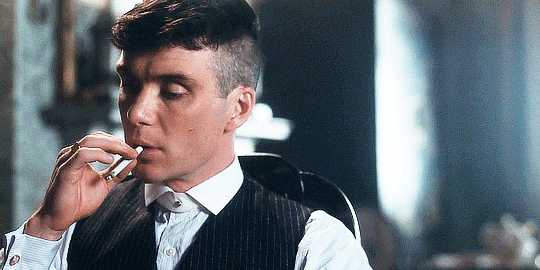
As demonstrated by: Tommy Shelby from Peaky Blinders.
Why he could be a hero: He’s incredibly charismatic, intelligent, and courageous. He deeply cares for his loved ones, has a strict code of honor, reacts violently to the mistreatment of innocents, and demonstrates surprisingly high levels of empathy.
Why he’s an antihero: He also happens to be a ruthless, incredibly violent crime lord who regularly slashes out his enemies’ eyes.
What he can teach us: From the moment Tommy Shelby makes his entrance, it becomes apparent that Peaky Blinders will not unfold like the archetypical crime drama. Evocative of the outlaw mythos of the Old West, Tommy rides across a smoky, industrialized landscape. He is immaculately dressed, bareback, on a magnificent black horse. A rogue element, his presence carries immediate power, causing pedestrians to hurriedly clear a path. You get the sense that he does not conform to this time or era, nor does he abide by the rules of society.

The ONLY acceptable way to introduce a protagonist.
Set in the decades between World War I and II, Peaky Blinders differentiates itself from its peers, not just because of its distinctive, almost Shakespearian style of storytelling, powerful visual style, and use of contemporary music, but also in the manner in which it shows that society provokes the very criminality it attempts to vanquish. Moreover, it dedicates time to demonstrating why this form of criminality is sometimes the only option for success in an unfair system. When the law wants to keep you relegated to the station in which you were born, success almost inevitably means breaking the rules. Tommy is considered one of the most influential characters of the decade because of the manner in which he embodies this phenomenon, and the reason why antiheroes pervade folklore across the decades.
Peaky Blinders engenders a unique level of empathy within its first episodes, in which we are not just immersed in the glamour of the gangster lifestyle, but we understand the background that provoked it. Tommy, who grew up impoverished and discriminated against due to his “didicoy” Romany background, volunteered to fight for his country, and went to war as a highly intelligent, empathetic young man. He returned with the knowledge that the country he had served had essentially used him and others like him as canon fodder, with no regard for their lives, well-being, or future. Such veterans were often looked down upon or disregarded by a society eager to forget the war. Having served as a tunneler – regarded to be the worst possible position in a war already beset by unprecedented brutality – Tommy’s constant proximity to death not only destroyed his faith in authority, but also his fear of mortality. This absence of fear and deference, coupled with his incredible intelligence, ambition, ruthlessness, and strategic abilities, makes him a dangerous weapon, now pointed at the very society that constructed him to begin with.
It is also difficult to critique Tommy’s criminality, when we take into account that society would have completely stifled him if he had abided by its rules. As someone of Romany heritage, he was raised in abject poverty, and never would have been admitted into situations of higher social class. Even at his most powerful, we see the disdain his colleagues have at being obligated to treat him as an equal. In one particularly powerful scene, he begins shoveling horse manure, explaining that, “I’m reminding myself of what I’d be if I wasn’t who I am.” If he hadn’t left behind society’s rules, his brilliant mind would be occupied only with cleaning stables.
However, the necessity of criminality isn’t depicted as positive: it is one of the greatest tragedies of the narrative that society does not naturally reward the most intelligent or gifted, but instead rewards those born into positions of unjust privilege, and those who are willing to break the rules with intelligence and ruthlessness. Each year, the trauma of killing, nearly being killed, and losing loved ones makes Tommy’s PTSD increasingly worse, to the point at which he regularly contemplates suicide. Cillian Murphy has remarked that Tommy gets little enjoyment out of his wealth and power, doing what he does only for his family and “because he can.” Steven Knight cites the philosophy of Francis Bacon as a driving force behind Tommy’s psychology: “Since it’s all so meaningless, we might as well be extraordinary.”

This is further complicated when it becomes apparent that the upper class he’s worked so arduously to join is not only ruthlessly exclusionary, but also more corrupt than he’s ever been. There are no easy answers, no easy to pinpoint sources of societal or personal issues, no easy divisibility of positive and negative. This duality is something embraced by the narrative, and embodied by its protagonist. An intriguingly androgynous figure, Tommy emulated the strength and tenacity of the women in his life, particularly his mother; however, he also internalized her application of violence, even laughing about how she used to beat him with a frying pan. His family is his greatest source of strength and his greatest weakness, often exploited by his enemies who realize they cannot fall back on his fear of mortality. He feels emotions more strongly than the other characters, and ironically must numb himself to the world around him in order to cope with it.
However, all hope is not lost. Creator Steven Knight has stated that his hope is ultimately to redeem Tommy, so by the show’s end he is “a good man doing good things.” There are already whispers of what this may look like: as an MP, Tommy cares for Birmingham and its citizens far more than any “legitimate” politicians, meeting with them personally to ensure their needs are met; as of last season, he attempted a Sinatra-style assassination of a rising fascist simply because it was the right thing to do. “Goodness” is an option in the world of Peaky Blinders; the only question is what form it will take on a landscape plagued by corruption at every turn.
Regardless of what form his “redemption” might take, it’s negligible that Tommy will ever meet all the criteria of an archetypal hero as we understand it today. He is far more evocative of the heroes of Ancient Greece, of the Old West, of the Golden Age of Piracy, of Feudal Japan – ferocious, magnitudinous figures who move and make the earth turn with them, who navigate the ever-changing landscapes of society and refuse to abide by its rules, simultaneously destructive and life-affirming. And that’s what makes him so damn compelling.
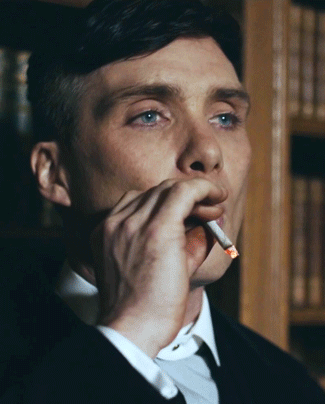
Who needs traditional morality, when you look this damn good?
Other examples:
Alfie Solomons from Peaky Blinders. Tommy’s friend and sometimes mortal enemy, the two develop an intriguing, almost romantic connection due to their shared experiences of oppression and powerful intellects. Steven Knight has referred to Alfie as “the only person Tommy can really talk to,” possibly because he is Tommy’s only intellectual equal, resulting in a strange form of spiritual matrimony between the two.
Omar Little from The Wire, an oftentimes tender and compassionate man who cares deeply for his loved ones, and does his best to promote morality and idealism in a society which offers him few viable methods of doing so. He may rob drug dealers at gunpoint, but he also refuses to harm innocents, dislikes swearing, and views his actions as a method of decreasing crime in the area.
Chiron from Moonlight, a sensitive and empathetic young man who became a drug dealer because society had provided him with virtually no other options for self-sustenance. The same could be said for Chiron’s mentor and father figure, Juan, a kind and nurturing man who is also a drug dealer.
To a lesser extent, Tony from The Sopranos, and other fictional Italian American gangsters. The Sopranos often negotiates the roots of mob culture as a response to inequalities, while also holding its characters accountable for their actions by pointing out that Tony and his ilk are now rich and privileged and face little systematic discrimination.
Walter White from Breaking Bad – an underpaid, chronically disrespected teacher who has to work two jobs and still can’t afford to pay for medical treatment. More on him on the next page.
Antiheroes show us how we can be the villains.
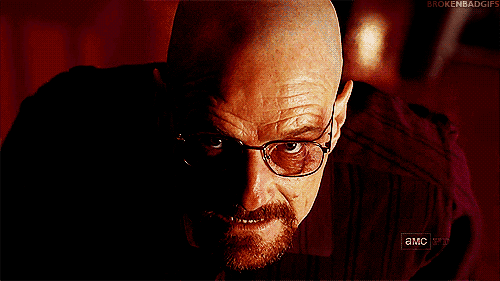
As demonstrated by: Walter White from Breaking Bad.
Why he could be a hero: He’s a brilliant, underappreciated chemist whose work contributed to the winning of a Nobel Prize. He’s also forging his own path in the face of incredible adversity, and attempting to provide for his family in the event of his death.
Why he’s an antihero: In his pre-meth days, Walt failed to meet the exceptionalism associated with heroes, as a moral but socially passive underachiever living an unremarkable life. At the end of his transformation, he is exceptional at what he does, but has completely lost his moral standards.
What he can teach us: G.K. Chesterton wrote, “Fairy tales do not tell children that the dragons exist. Children already know that dragons exist. Fairy tales tell children the dragons can be killed.” Following this analogy, it is equally important that our stories show us we, ourselves, can be the dragon. Or the villain, to be more specific, because being a dragon sounds strangely awesome.
Walter White of Breaking Bad is a paragon of antiheroism for a reason: he subverts almost every traditional aspect of heroism. From the opening shots of Walt careening along in an RV, clad in tighty whities and a gas mask, we recognize that he is neither physically capable, nor competent in the manner we’ve come to expect from our heroes. He is not especially conventionally attractive, nor are women particularly drawn to him. He does not excel at his career or garner respect. As the series progresses, Walt does develop the competence, confidence, courage, and resilience we expect of heroes, but he is no longer the moral protagonist: he is self-motivated, vindictive, and callous. And somehow, he still remains identifiable, which is integral to his efficacy.
But let us return to the beginning of the series, and talk about how, exactly, Walt subverts our expectations from the get-go. Walt is the epitome of an everyman: he’s fifty years old, middle class, passive, and worried about identifiable problems – his health, his bills, his physically disabled son, and his unborn baby. Whereas Tommy Shelby’s angelic looks, courage, and intellect subvert our preconceptions about what a criminal can be, Walt’s initial unremarkability subverts our preconceptions about who can be a criminal. The hook of the series is the idea that a man so chronically average could make and distribute meth.
Just because an audience is hooked by a concept, however, does not mean that they’ll necessarily continue watching. Breaking Bad could have easily veered into ludicrosity, if it weren’t for another important factor: character. Walt is immediately and intensely relatable, and he somehow retains our empathy for the entirety of the series, even at his least forgivable.
When we first meet Walt, his talents are underappreciated, he’s overqualified for his menial jobs, chronically disrespected by everyone around him, underpaid, and trapped in a joyless, passionless life in which the highlight of his day is a halfhearted handjob from his distracted wife. And to top it all off? He has terminal lung cancer. Happy birthday, Walt.
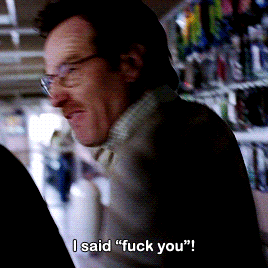
We root for him for the same reason we root for Dumbo, Rudolph, Harry Potter: he’s an underdog. The odds are stacked against him, and we want to see him triumph. Which is why it’s cathartic, for us and for Walt, when he finally finds a profession in which he can excel – even if that profession is the ability to manufacture incredibly high-quality meth. His former student Jesse Pinkman – a character so interesting that there’s a genuine risk he’ll hijack this essay – appreciates his skill, and this early appreciation is what makes his relationship with Jesse feel so much more genuine than Walt’s relationship with his family, even as their dynamic becomes increasingly unhealthy and Walt uses Jesse to bolster his meth business and his ego. This deeply dysfunctional but heartfelt father-son connection is Walt’s tether to humanity as he becomes increasingly inhumane, while also demonstrating his descent from morality. It has been pointed out that one can gauge how far-gone Walt is from his moral ideals by how much Jesse is suffering.
But to return to the initial point, it is imperative that we first empathize with Walt in order to adequately understand his descent. Aside from the fact that almost all characters are more interesting if the audience can or wants to empathize with them, Walt’s relatability makes it easy to understand our own potential for toxic and destructive behaviors. We are the protagonist of our own story, but we aren’t necessarily its hero.
Similarly, we understand how easily we can justify destructive actions, and how quickly reasonable feelings of anger and injustice swerve into self-indulgent vindication and entitlement. Walt claims to be cooking meth to provide for his family, and this may be partially true; but he also denies financial help from his rich friends out of spite, and admits later to his wife Skylar that he primarily did it for himself because he was good at it and “it made (him) feel alive.”
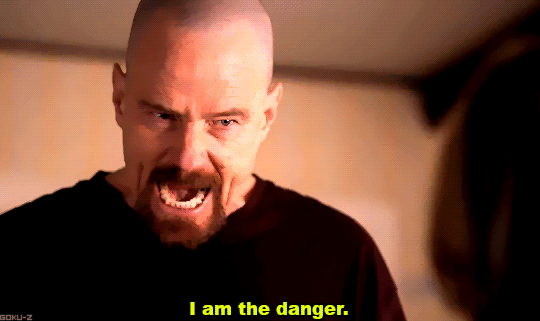
This also forces us to examine our preconceptions, and essentially do Walt’s introspections for him: whereas Peaky Blinders emphasize the fact that Tommy and his family would never have been able to achieve prosperity by obeying society’s laws, Walt feels jilted out of success he was promised by a meritocratic system that doesn’t currently exist. He has essentially achieved our current understanding of the American dream – a house with a pool, a beautiful wife and family, an honest job – but it left him unable to provide for his wife and children or even pay for his cancer treatment. He’s also unhappy and alienated from his passions and fellow human beings. With this in mind, it’s understandable – if absurd – that the only way he can attain genuine happiness and excel is through becoming a meth cook. In this way, Breaking Bad is both a scathing critique of our current society, and a haunting reminder that there’s not as much standing between ourselves and villainy as we might like to believe.
So are we all slaves to this system of entitlement and resentment, of shattered and unfulfilling dreams? No, because Breaking Bad provides us with an intriguing and vital counterpoint: Jesse Pinkman. Whereas Walt was bolstered with promises that he was gifted and had a bright future ahead of him, Jesse was assured by every authority figure in his life that he would never amount to anything. However, Jesse proves himself skilled at what he’s passionate about: art, carpentry, and of course, cooking meth. Whereas Walt perpetually rationalizes and shirks responsibility, Jesse compulsively takes responsibility, even for things that weren’t his fault. Whereas Walt found it increasingly acceptable to endanger or harm bystanders, Jesse continuously worked to protect innocents – especially children – from getting hurt. Though Jesse suffered immensely throughout the course of the show – and the subsequent movie, El Camino – the creators say that he successfully made it to Alaska and started a carpentry business. Some theorists have supposed that Jesse might be a Jesus allegory – a carpenter who suffers for the sins of others. Regardless of whether this is true, it is interesting, and amusing to imagine Jesus using the word “bitch” so often. Though he didn’t get the instant gratification of immediate success that Walt got, he was able to carve (no pun intended – carpentry, you know) a place for himself in the world.
Jesse isn’t a perfect person, but he reminds us that improving ourselves and creating a better life is an option, even if Walt’s rise to power was more initially thrilling. So take heart: there’s a bit of Heisenberg in all of us, but there’s also a bit of Jesse Pinkman.
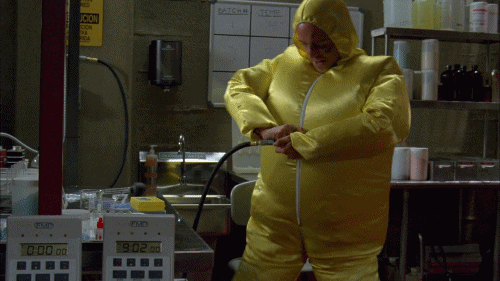
The savior we all need, but don’t deserve.
Other examples:
Bojack from Bojack Horseman. Like Walt, the audience can’t help but empathize with Bojack, understand his decision-making, and even see ourselves in him. However, the narrative ruthlessly demonstrates the consequences of his actions, and shows us how negatively his selfishness and self-destructive qualities impact others.
Again, Tony Soprano. Tony, even at his very worst, is easy to like and empathize with. Despite his position as a mafia Godfather, he’s unfailingly human. Which makes the destruction caused by his actions all the more resonant.
Antiheroes emphasize the absurdity of contemporary culture (and how we must operate in it.)

As demonstrated by: Marty Byrde from Ozark.
Why he could be a hero: He’s a loving father who ultimately just wants to provide for and ensure the safety of his family. He’s also fiercely intelligent, with excellent negotiative, interpersonal, and strategic skills that allows him to talk his way out of almost any situation without the use of violence.
Why he’s an antihero: He launders money for a ruthless drug cartel, and has no issue dipping his toes into various illegal activities.
Why he’s compelling: Marty is an antihero of the modern era. He has a remarkable ability to talk his way into or out of any situation, and he’s also a master of using a pre-constructed system of rules and privileges to his benefit.
In the very first episode, he goes from literally selling the American Dream, to avoiding murder at the hands of a ruthless drug cartel by planning to launder money for them in the titular Ozarks. Despite his long history of dabbling in illegality, Marty has no firearms – a questionable choice for someone on the run from violent drug kingpins, but a testament to his ability to rely on his oratory skills and nothing else. He doesn’t hesitate to engage an apparently violent group of hillbillies to request the return of his stolen cash, because he knows he can talk them into giving it back to him. The only time he engages other characters in physical violence, he immediately gets pummeled, because physical altercation has never been his form of currency. Not that he’s subjected to physical violence particularly often, either: Marty is a master of the corporate landscape, which makes him a master of the criminal landscape. He is brilliant at avoiding the consequences of his actions.

It’s easy to like and admire Marty for his cleverness, for being able to escape from apparently impermeable situations with words as his only weapon. He’s got a reassuring, dad-ly sort of charisma that immediately endears the viewer, and offers respite from the seemingly endless threats coming from every direction. He unquestionably loves his family, including his adulterous wife. As such, it’s easy to forget that Marty is being exploited by the same system that exploits all of us: crony capitalism. The polar opposite of meritocratic capitalism – in which success is based on hard work, ingenuity, and, hence the name, merit – crony capitalism benefits only the conglomerates that plague the global landscape like cancerous warts, siphoning money off of workers and natural capital, keeping them indentured with basic necessities and the idle promise of success.
Marty isn’t benefiting from his hard work in the Ozarks. Everything he makes goes right back to the drug cartel who continuously threatens the life of him and his family. He is rewarded for his efforts with a picturesque house, a boat, and the appearance of success, but he is not allowed to keep the fruits of his labor. Marty may be an expert at navigating the corporate and criminal landscape, but it still exploits him. In this manner, Marty embodies both the American business, the American worker, and a sort of inversion of the American dream.
In this same manner, Marty, the other characters, and even the Ozarks themselves embody the modern dissonance between appearance and reality. Marty’s family looks like something you’d respect to see on a Christmas card from your DILF-y, successful coworker, but it’s bubbling with dysfunctionality. His wife is cheating on him with a much-older man, and instead of confronting her about it, he first hired a private investigator and then spent weeks rewatching the footage, paralyzed with options and debating what to do. The problem somewhat solves itself when his wife’s lover is unceremoniously murdered by the cartel, and Wendy and Marty are driven into a sort of matrimonial business partnership motivated by the shared interest of protecting their children, but this also further demonstrates how corporate even their family dealings have become. His children, though precocious, are forced to contend with age-inappropriate levels of responsibility and the trauma of sudden relocation, juxtaposed with a childhood of complete privilege up until this point.
Conversely, the shadow of the Byrde family is arguably the Langmores. Precocious teenagers Ruth and Wyatt can initially be shrugged off as local hillbillies and budding con-artists, but much like the Shelby family of the Peaky Blinders, they prove to be extremely intelligent individuals suffering beneath a society that doesn’t care about their stifled potential. Systemic poverty is a bushfire that spreads from one generation to the next, stoked by the prejudices of authority figures and abusive parental figures who refuse to embrace change out of a misguided sense of class-loyalty.
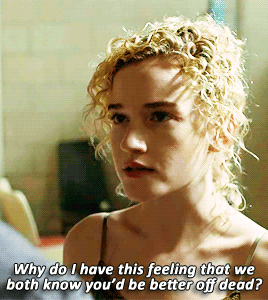
Almost every other character we meet eventually inverts our expectations of them: from the folksy, salt-of-the-earth farmers who grow poppies for opium and murder more remorselessly than the cartel itself, to the cookie-cutter FBI agent whose behavior becomes increasingly volatile and chaotic, to the heroin-filled Bibles handed out by an unknowing preacher, to the secrets hidden by the lake itself, every detail conveys corruption hidden behind a postcard-pretty picture of tranquility and success.
Marty’s awareness of this illusion, and what lurks behind it, is perhaps the greatest subversion of all. Marty knows that the world of appearance and the world of reality coexist, and he was blessed with a natural talent for navigating within the two. Like Walter White, Marty makes us question our assumptions about who a criminal can be – despite the fact that many successful, attractive, middle-aged family men launder money and juggle criminal activities, it’s still jarring to witness, which tells us something about how image informs our understanding of reality. Socially privileged, white-collar criminals simply have more control over how they’re portrayed than an inner-city gang, or impoverished teenagers. However, unlike Walt, Marty’s criminal activities are not any kind of middle-aged catharsis: they’re a way of life, firmly ingrained in the corporate landscape. They were present long before he arrived on the scene, and he knows it. He just has to navigate them.
Just like our shining, messianic heroes can teach us about truth, justice, and the American way, so too does each antihero have something to teach us: they teach us that society doesn’t reward those who follow its instructions, nor does it often provide an avenue of morality. Even if you live a life devoid of apparent sin, every privilege is paid for by someone else’s sacrifice. But the best antiheroes are not beacons of nihilism – they show us the beauty that can emerge from even the ugliest of situations. Peaky Blinders is, at its core, a love story between Tommy Shelby and the family he crawled out of his grave for, just as Breaking Bad is ultimately a deeply dysfunctional tale of a father figure and son. Ozark, like its predecessors, is about family – the only authenticity in a society that operates on deception, illusion, and corruption. They teach us that even in the worst times and situations, love can compel us, redeem us, bind us closer together. Only then can we face the dragons of life, and feel just a bit more heroic.
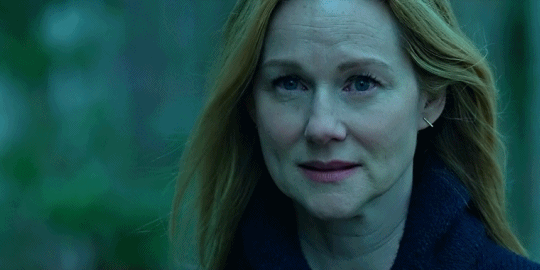
Other examples:
Don Draper from Mad Men. A similarly Shakespearian figure for the modern era, Don is a man who appears to have everything – perfect looks, a beautiful wife and children, a prestigious job. He could have stepped out of an ad for the American Dream. And yet, he feels disconnected from his life, isolated from others by the very societal rules he, as a member of the ad agency, helps to propagate. It helps that he’s literally leading a borrowed life, inherited from the stolen identity of his deceased fellow soldier, and was actually an impoverished, illegitimate farmboy whose childhood abuse permanently damaged his ability to form relationships. The Hopper-esque alienation evoked by the world of Mad Men really deserves an essay all it’s own, and his wife Betty – whose Stepford-level mask of cheerful subservience hides seething unhappiness and unfulfilled potential – is a particularly intriguing figure to explore. Maybe in my next essay, on the importance of the antiheroine.

#my writing tips#writing tips#tommy shelby#peaky blinders#walter white#breaking bad#jesse pinkman#bojack horseman#don draper#writing advice#antihero#the types of antiheroes#long post for ts
984 notes
·
View notes
Text
Theo Raeken, Scott McCall and the concept of betrayal in friendship - a Teen Wolf meta
Recently I came upon an interesting and somewhat subversive perspective on two phenomena that have been occupying my mind for a long time – friendship and betrayal. Because these two themes are not only often present in Teen Wolf, but are at the very core of season 5, I had some thoughts on the psychological concepts of friendship and betrayal in relation to the series.
General consensus in our view on both friendship and betrayal suggests that we tend to view friendship as a natural state of things developing through mutual trust and loyalty with love at its core, whereas betrayal is viewed as disruptive event that causes mostly pain, confusion and destruction. The perspective I am talking about considers the possibility that "the roots of both [friendship and betrayal] may draw their energy from the same deep layers of the human psyche" (French, Gosling and Case, 2009) and that betrayal is in fact not something that comes out of nowhere and disrupts friendship, but rather precedes it and constitutes its inherent part. It also introduces a very interesting concept of "virtuous betrayal", which may be regarded as "betrayal in the service of a higher purpose‟ (Krantz, 2006). Both betrayal and friendship are therefore complex phenomena, which according to the authors are interdependent and have deep impact on each other.
I'm going to start from the concept of virtuous betrayal, which to me is interesting and rather uncommon and puts Theo's attempts at dismantling the McCall pack in a new light (at least to me). In Status Asthmaticus (season 5, episode 10) Theo fully reveals the motivation behind his actions:
I never lied about why I came to Beacon Hills. I'm here for a pack. I came for the were-coyote. The one whose first instinct is to kill. I came for the banshee. The girl surrounded by death. The kitsune, the beta with anger issues, I came for Void Stiles. That's the pack I want. Unfortunately, it doesn't include Scott.
What we see here is something which may be regarded as a fundamental difference in Theo and Scott's understanding of what the pack and friendship as the force that binds it means. Scott's understanding of friendship has its roots in the concept that Aristotle called vera amicitia or amicitia perfecta, a 'disinterested friendship', where the well-being of the others is of primary concern, and he is ready to make sacrifices he considers necessary (for example, his willingness to join Deucalion's pack of Alphas, knowing that there might be no way out of it once he agrees). Meanwhile Theo regards the pack mostly in terms of power and safety, where the element of friendship is non-existent. In his speech, he emphasizes only traits which are mostly viewed as negative, which is very revealing when it comes to his understanding of the world and its rules. He genuinely believes that removing Scott from his position as the pack leader is for the greater good; to him, friendship, love and caring that constitute the basis of Scott's pack are all weaknesses. This is the result of his formative years spent under the 'care' of The Dread Doctors and the values instilled in him, which are the exact opposite of what Scott believes in. Theo views the pack and leadership through the lens of utilitarianism, "to the exclusion of the pursuit of virtue and commitment to the good" (French, Gosling and Case, 2009), which is the complete opposite of what Scott believes in. He knows the Doctors' main goal – unleashing of the Beast of Gevaudan – and wants to get out alive; his main goal is survival. It is worth mentioning that he also operates from the point of a deeply rooted inferiority complex ("I'm not even a real werewolf"). Therefore he believes that what guarantees him survival and safety is securing his position as the leader of a pack by fear and control instead of mutual trust and loyalty.
This perspective raises the question of the degree to which he can be held responsible for his actions. I tend to disagree both with the view according to which Theo is considered only a victim, as well as the one which considers him only a "bad guy" without taking into consideration all the mitigating circumstances surrounding the way he was raised. We all act according to the values imprinted in us in early childhood, which shape the lens through which we view the world. Therefore, I deeply disagree with the view that Theo 'deserved' whatever happened to him. Of course, he does have the ability to make choices, and it doesn't excuse the bad ones he made (for example killing Josh and Tracy). However from his perspective, all the choices he made were necessary for both his survival and his attempts to feel whole, to be a real person instead of an artificial construct he perceives himself to be.
How does this relate to theory I mentioned above, which considers betrayal not only a fundamental part of human experience, but an inherent element of friendship, which in fact inevitably precedes it instead of outside force that disrupts it? Well, at this point it became obvious to me that this is exactly how Theo perceives the world. According to James Hillman and his reflections on betrayal as viewed through the myth of the Garden of Eden, betrayal is a natural and necessary stage in the „unfolding‟ of human consciousness (Hillman, 1975, in: French, Gosling and Case, 2009). Through betrayal, our real self is born, as it was depicted in the myth of the fall of Eden, in which the "death" described in Genesis – „of the tree of the knowledge of good and evil you shall not eat, for in the day that you eat of it you shall surely die‟ (Genesis 2:16) – means the death of illusions that we as human beings like to hide behind, for example perceiving people as either good or bad without understanding that humans are complex beings with different motivations and initial circumstances that formed them. In the case of Theo, he was already put at a deep disadvantage comparing to the rest of the pack members and had no chance to develop positive and healthy values and coping mechanisms that would enable him to earn what he desired instead of taking it by force, which was the only way he knew for his whole life. Again, that doesn't in any way negate traumas and hardships the other members of the pack went through, neither excuses Theo's behavior and the choices he made. I'm simply pointing out the factors that were a huge part of why he did what he did.
Now, let's get back to Scott. It's interesting to me that Scott, despite the fact that this view of the world and the values he believes in are very different than Theo's, seems to understand his motivations, at least to some degree:
Scared people do things you wouldn't believe. (season 6, episode 12)
Life can’t ever be all bad or all good. You know, eventually, things have to come back to the middle. (season 5, episode 1)
Especially the second quote (regression to the mean theory) is interesting, because to some degree it agrees with Hillman's theory about betrayal being the necessary part of evolving human consciousness and the 'death' of illusions that humanity develops to avoid facing uncomfortable truths about themselves (such as Stiles rejecting the 'shadow' part of himself which then manifests as the Nogitsune). Scott's deeply empathetic and caring nature explain his enormous ability to forgive things that most people would consider unforgivable, which is reflected in the scene of his death:
SCOTT: They're not like you. They never will be.
THEO: Because I'm a Chimera? Because I'm not a real werewolf?
SCOTT: Because you're barely even human.
Barely even human. Even in his darkest moment, as he is dying at the hands of his former close friend and now his greatest enemy, Scott refuses to fully dehumanize Theo. He doesn't call him a monster. He doesn't hurl insults towards him. He still considers him a person. In fact, he never in the course of the whole show acts hostile towards Theo or mistreats him, not even once, although he would have plenty of reasons. The main emotion he expresses towards Theo is deep disappointment. He doesn't even express regret in having trusted Theo. He decides to trust him again by sending him with Mason to the tunnels and by asking him to get to the hospital to take care of his friends, which – if this trust was misplaced – could have serious consequences.
Although perspective on betrayal as a fundamental part of human nature inevitably connected to friendship may seem somewhat pessimistic, it may also seem the opposite. "In our heart of hearts, we carry both experiences together: they coexist, so that if one is dominant, the other is always present as a 'shadow' (French, Gosling and Case, 2009)". From that perspective, we can understand the necessity of forgiveness more deeply and be ready to work on and develop our ability to forgive, which can in time become our greatest strength instead of our greatest weakness. Just like in case of Scott McCall, who – by forgiving the unforgivable – made his enemy, the man who betrayed him, turned his friends against him and murdered him, into his trusted ally.
44 notes
·
View notes